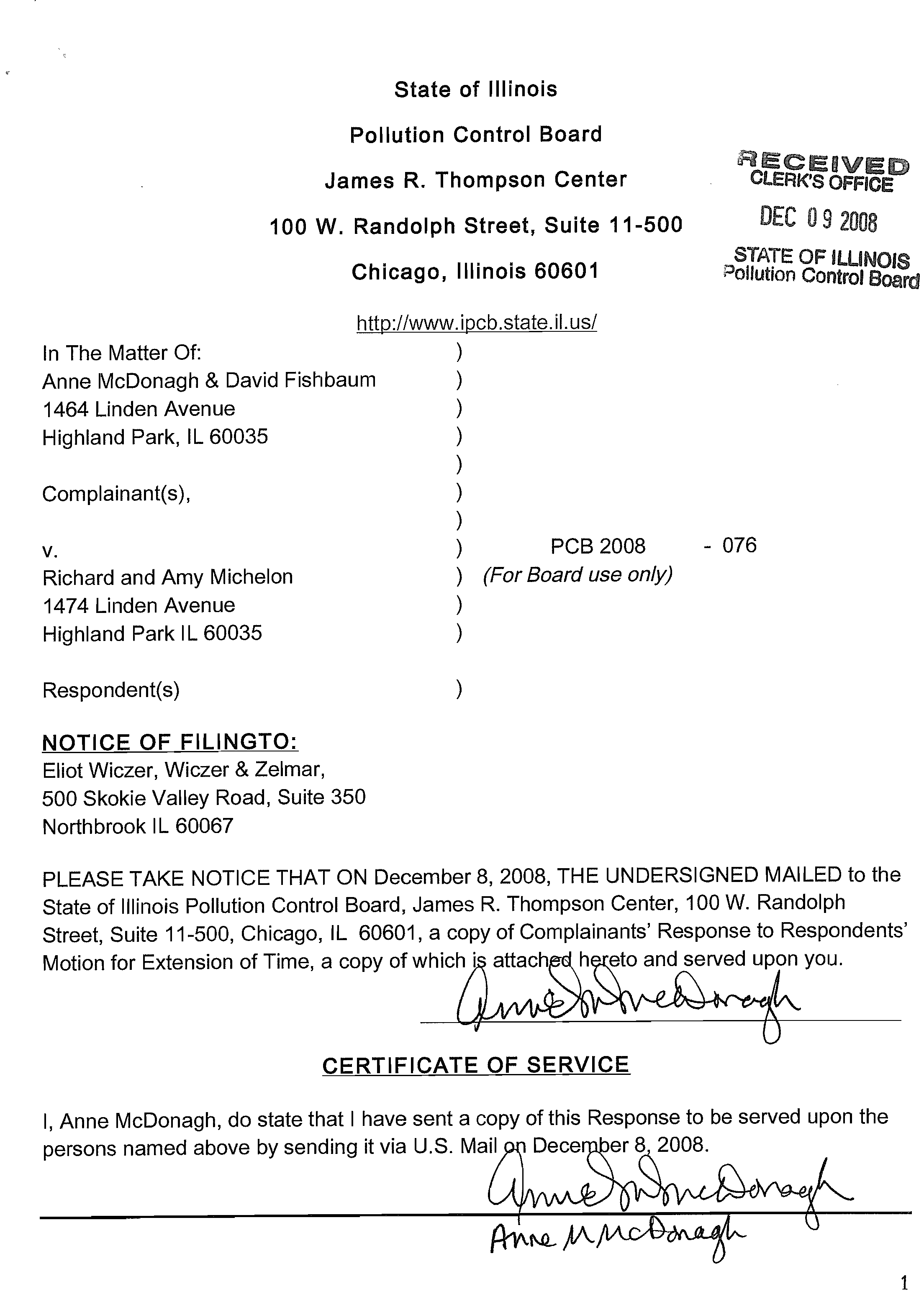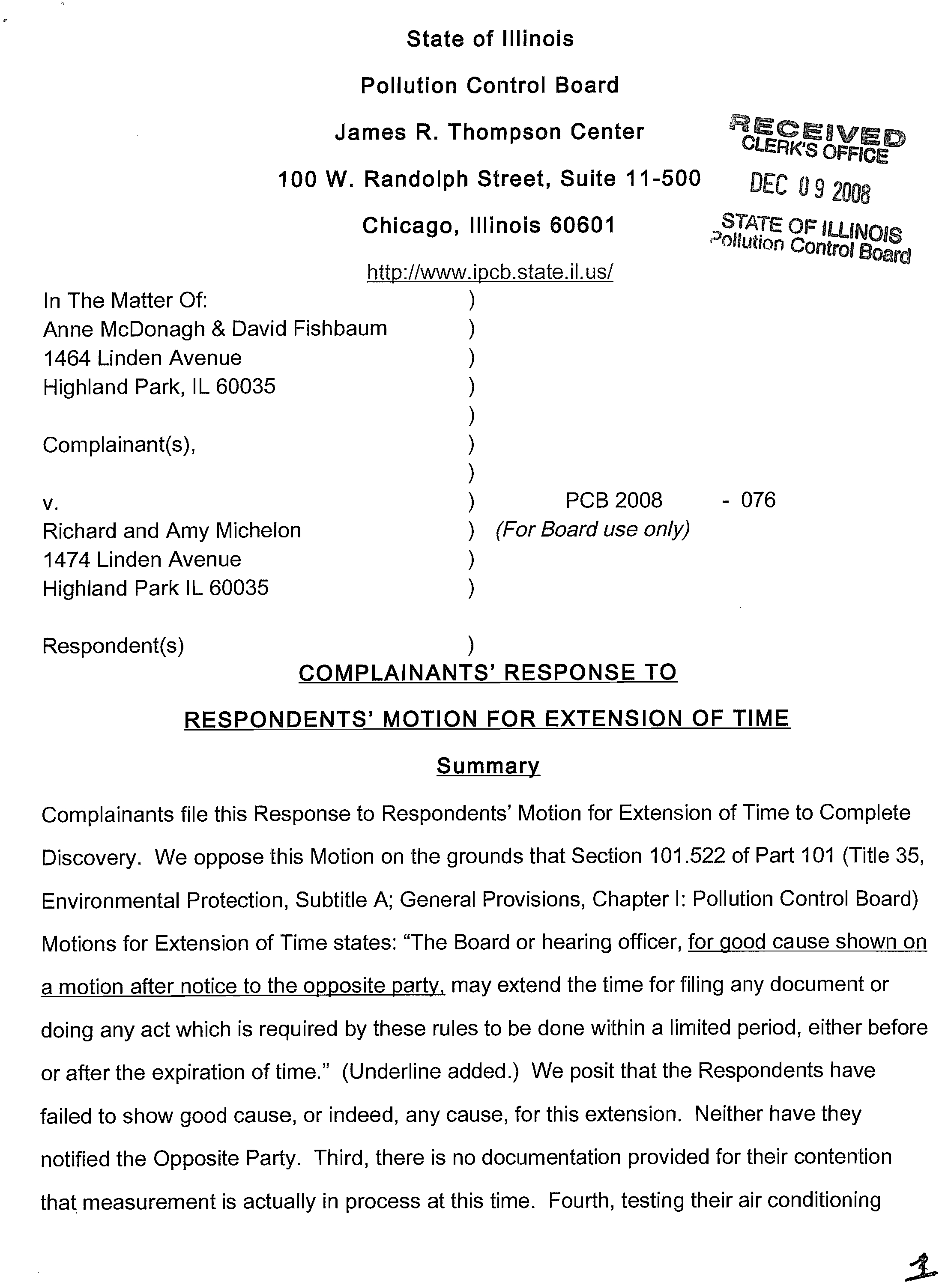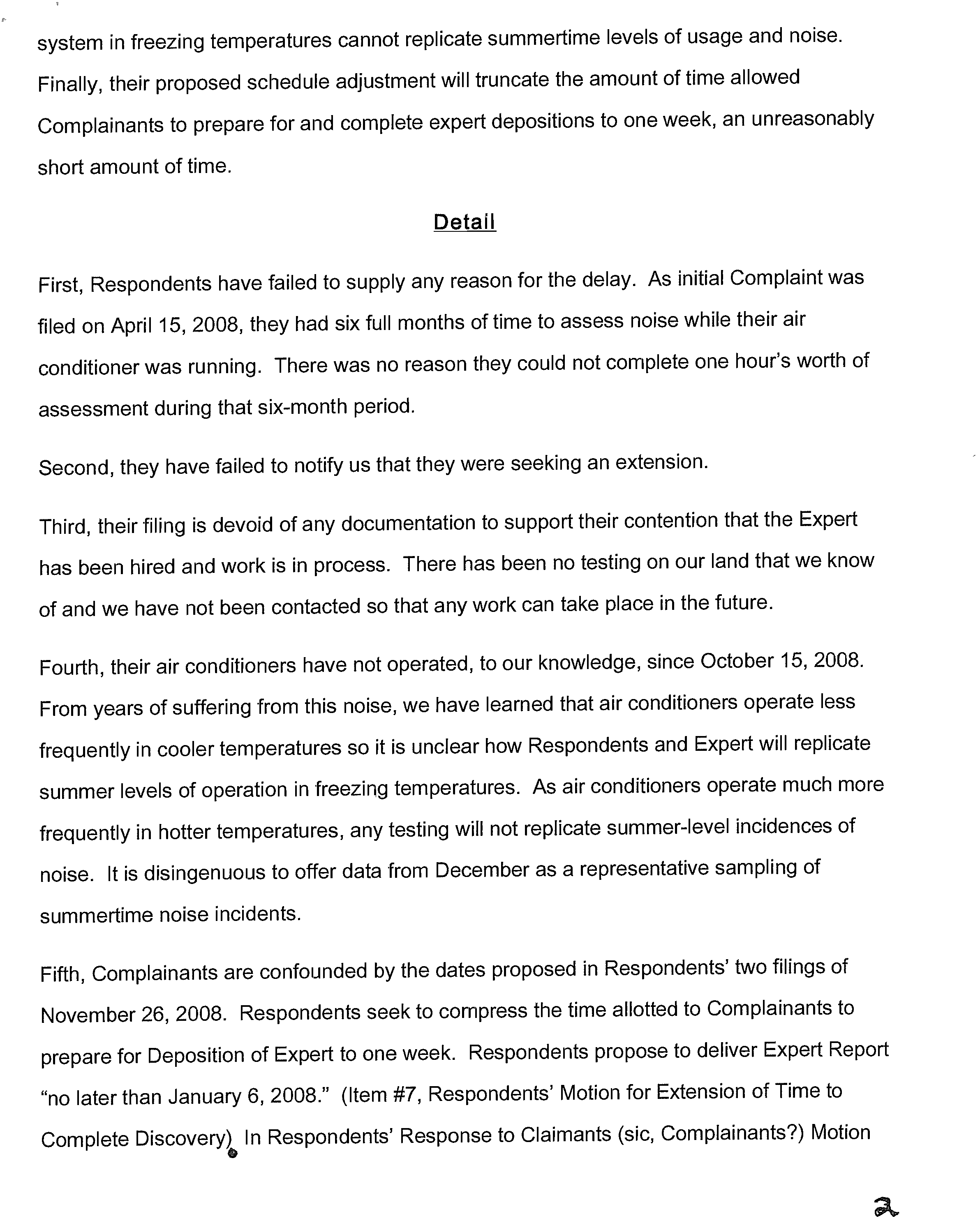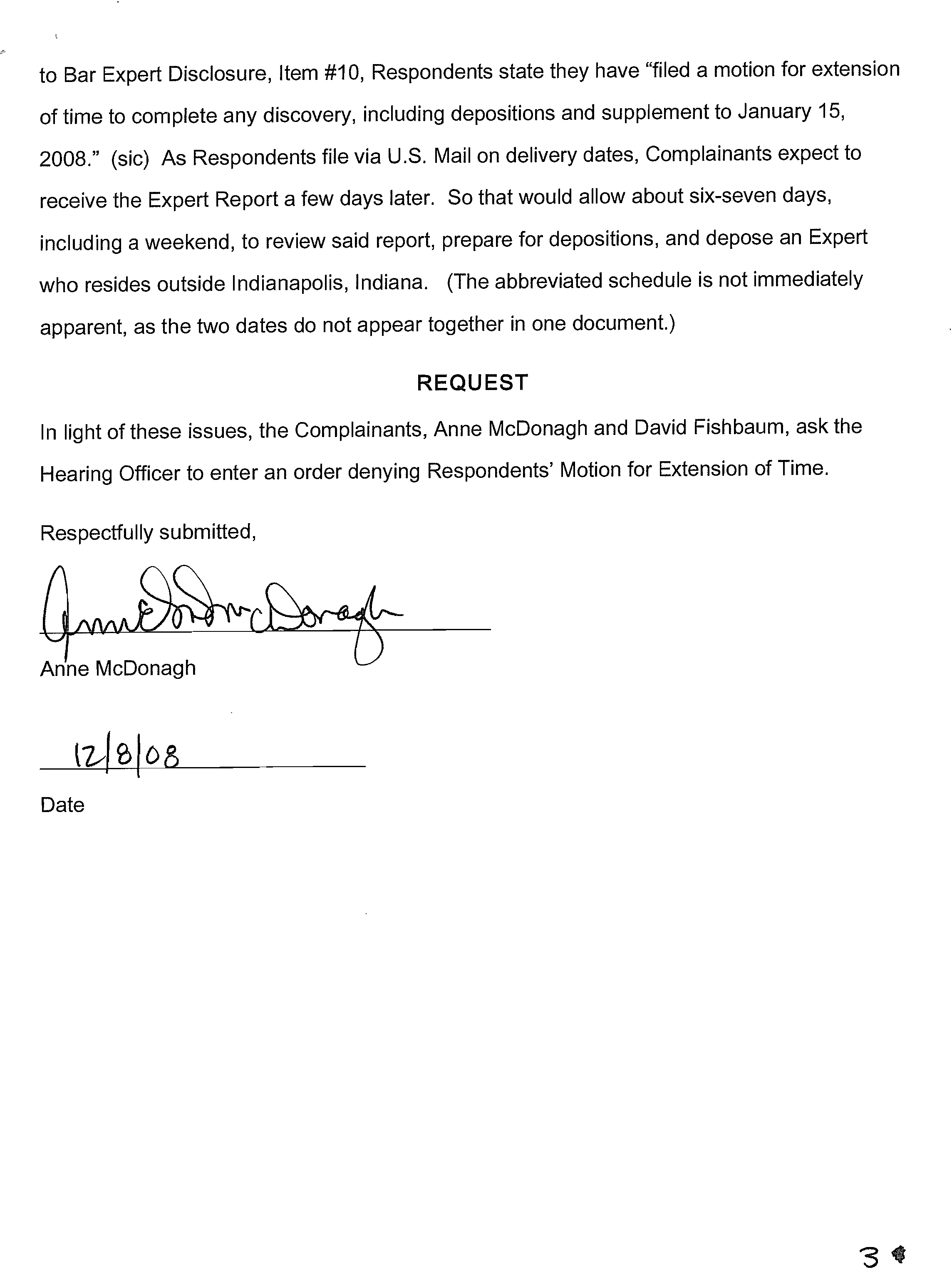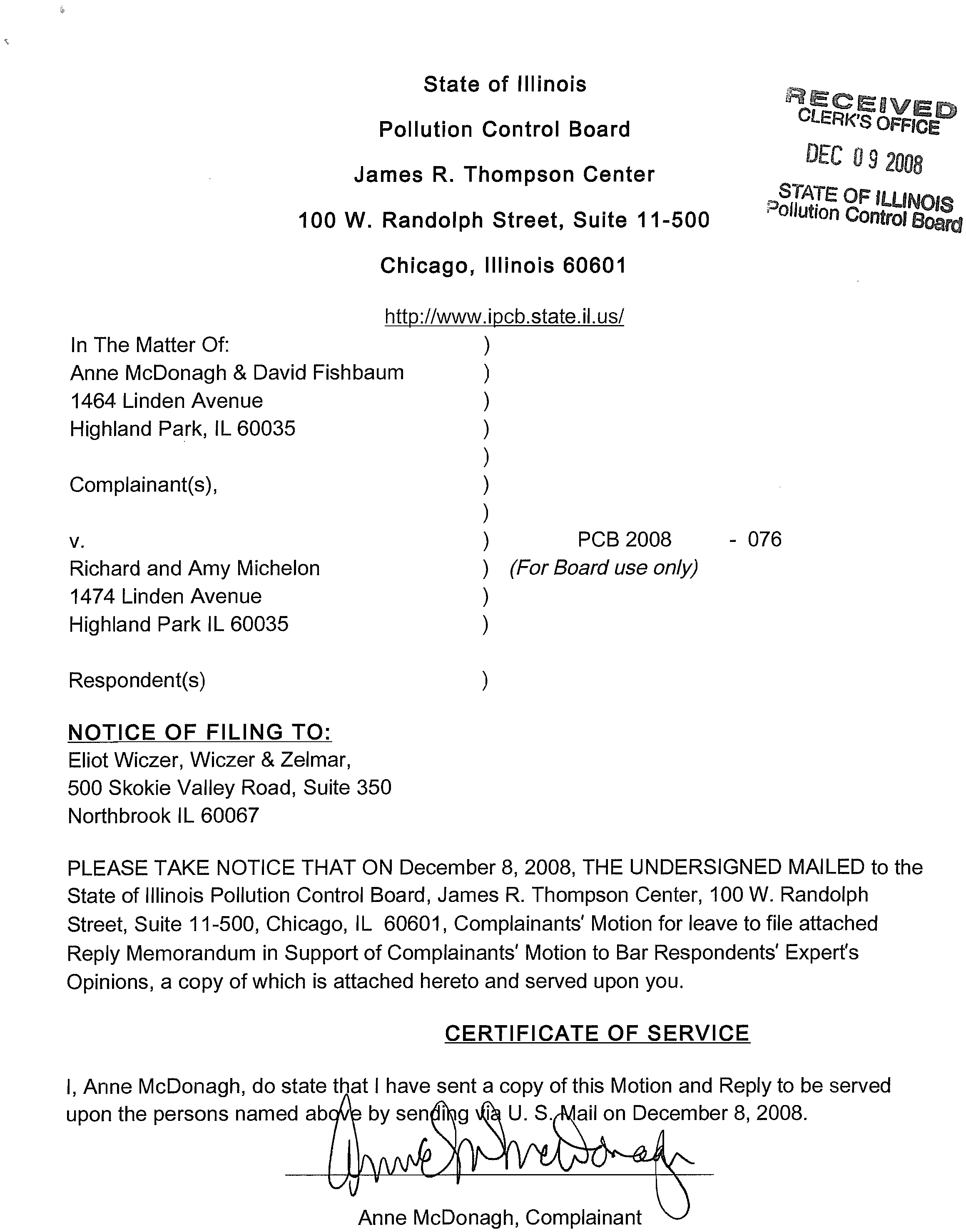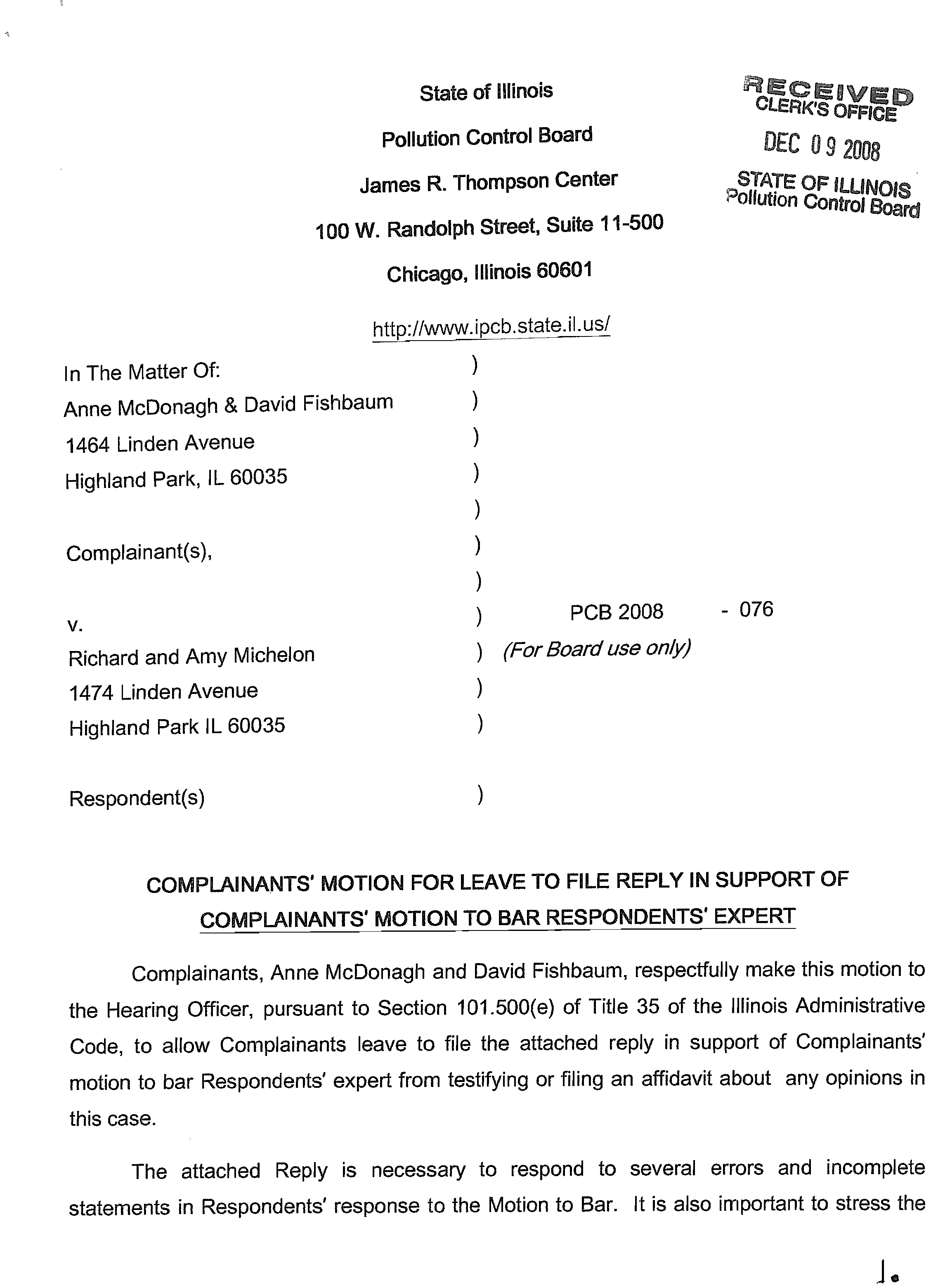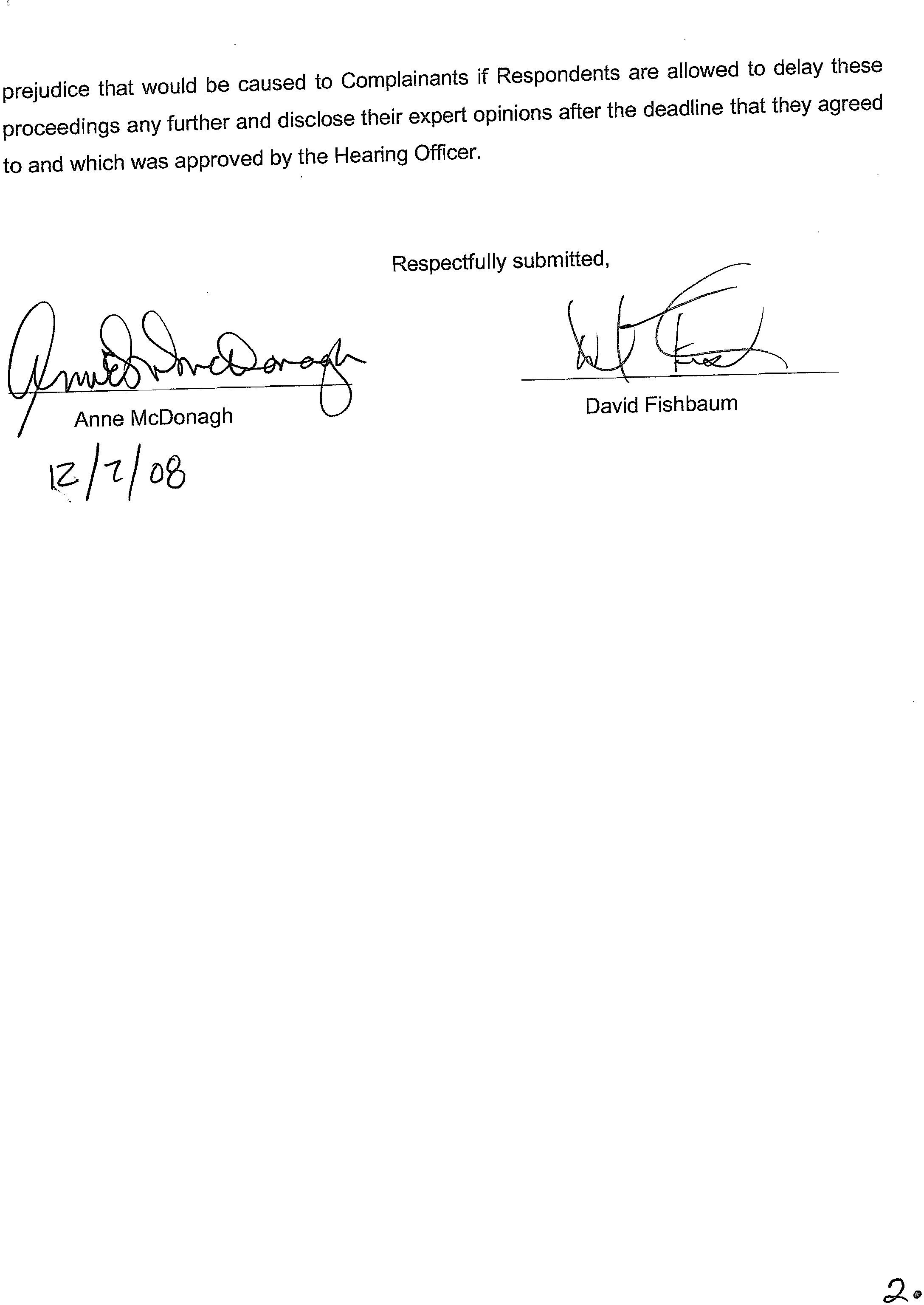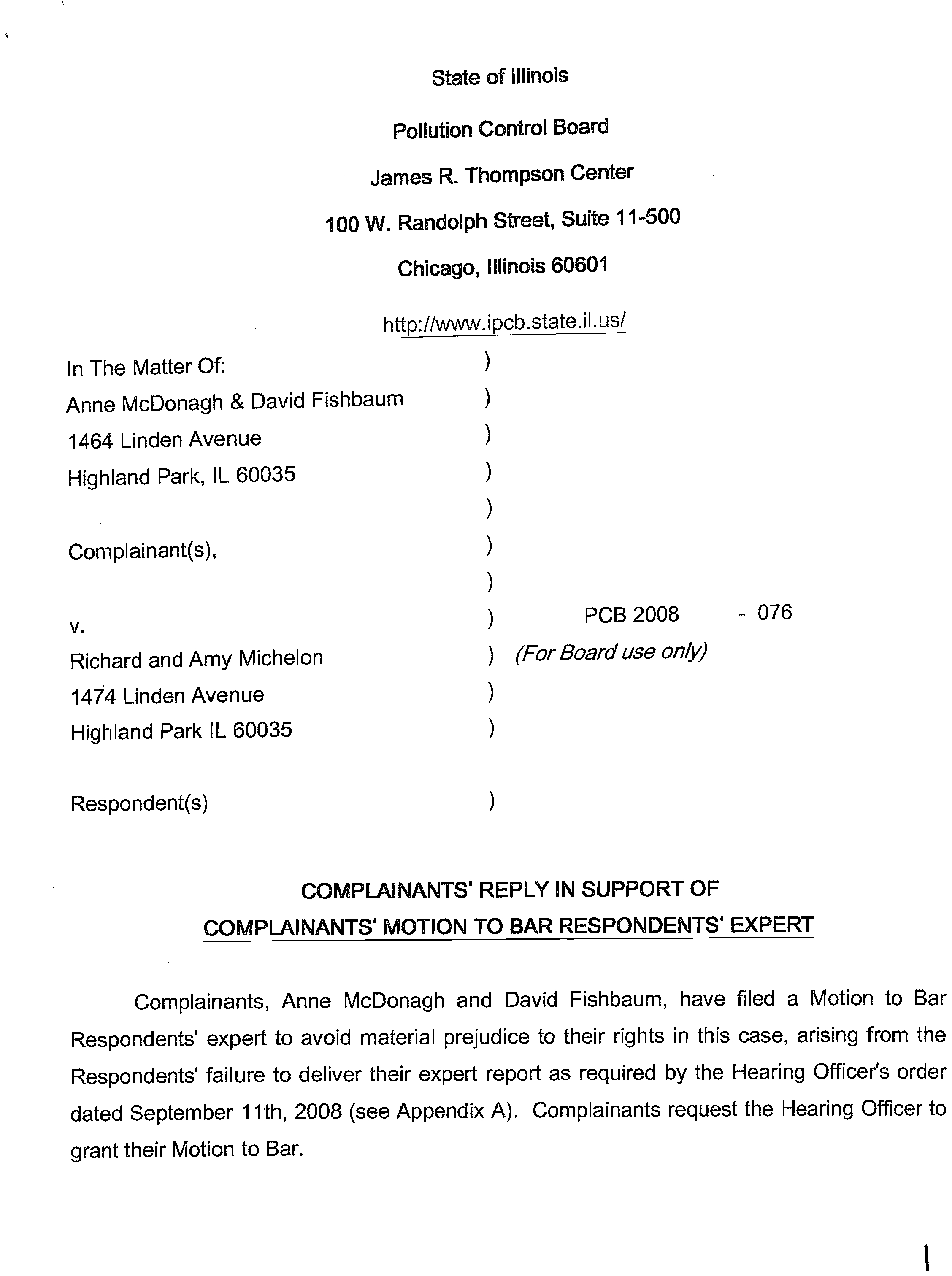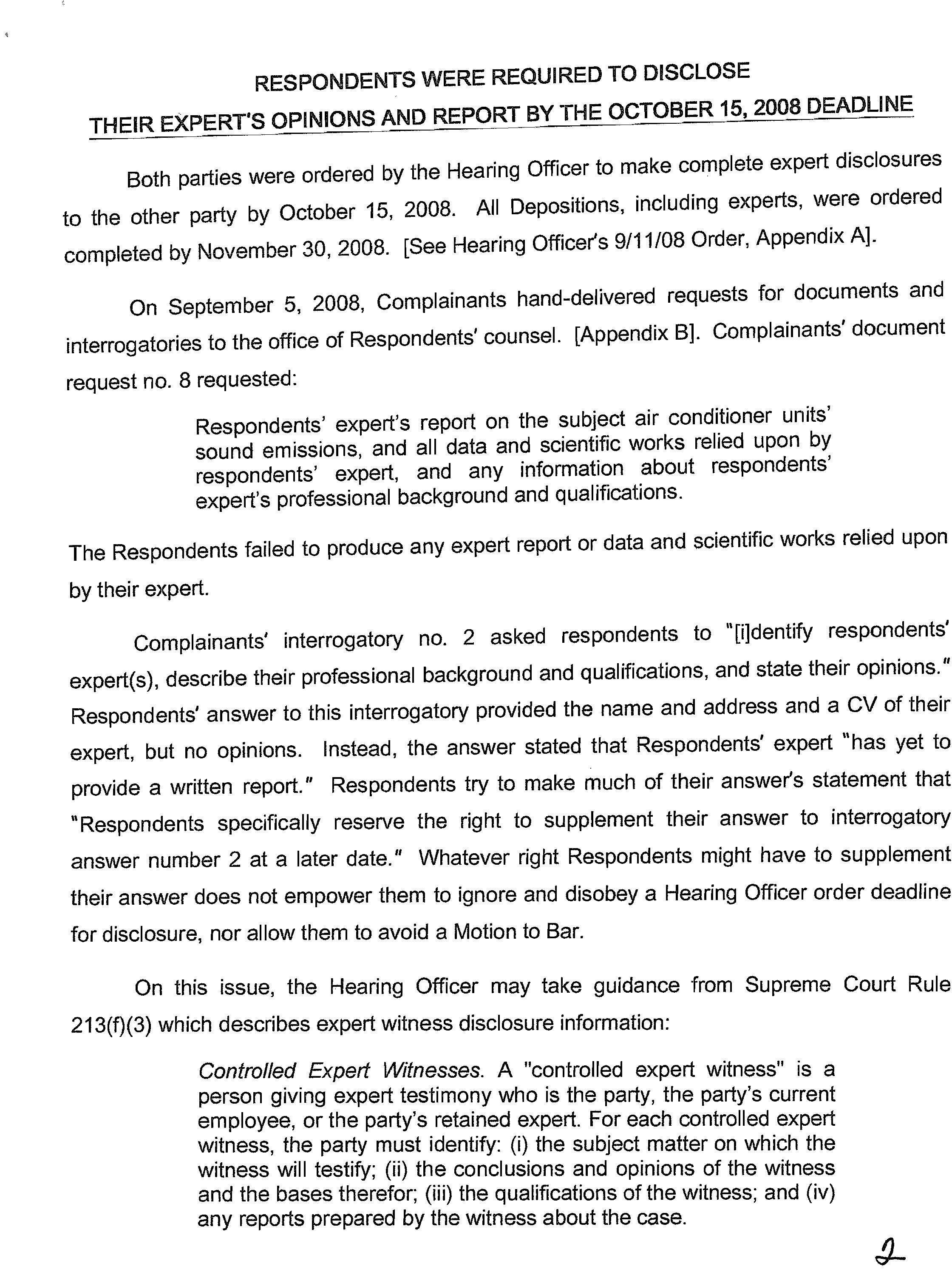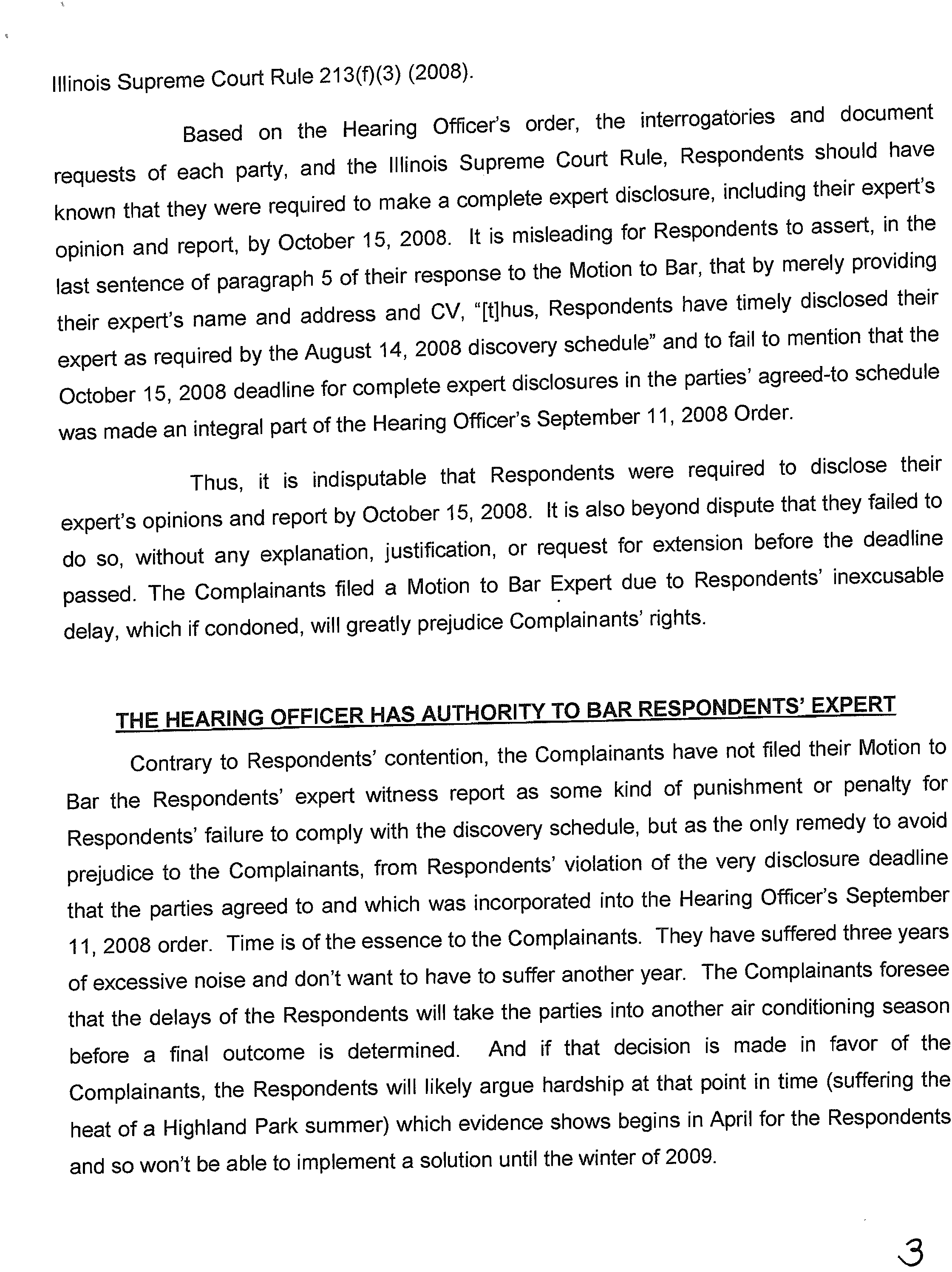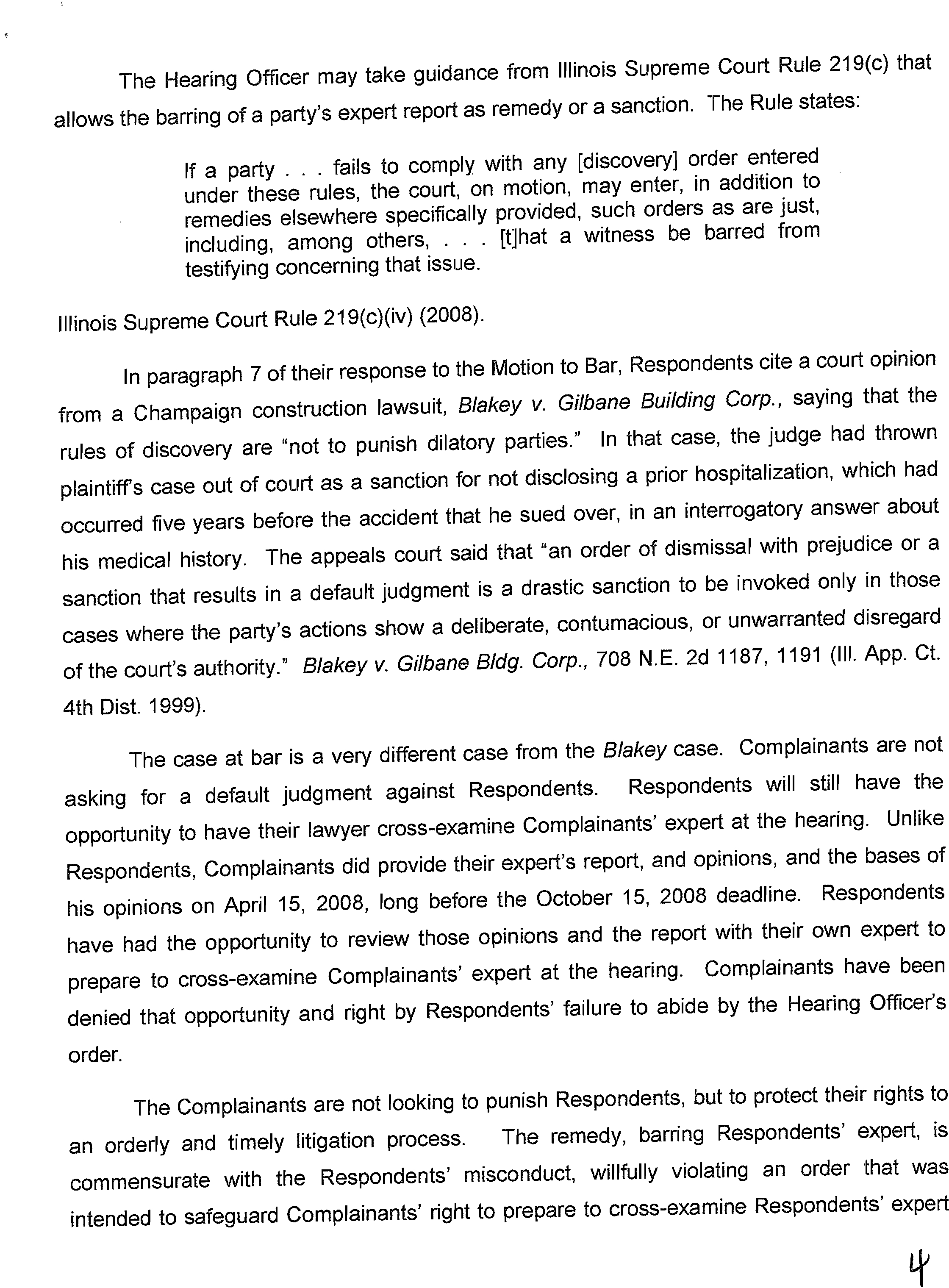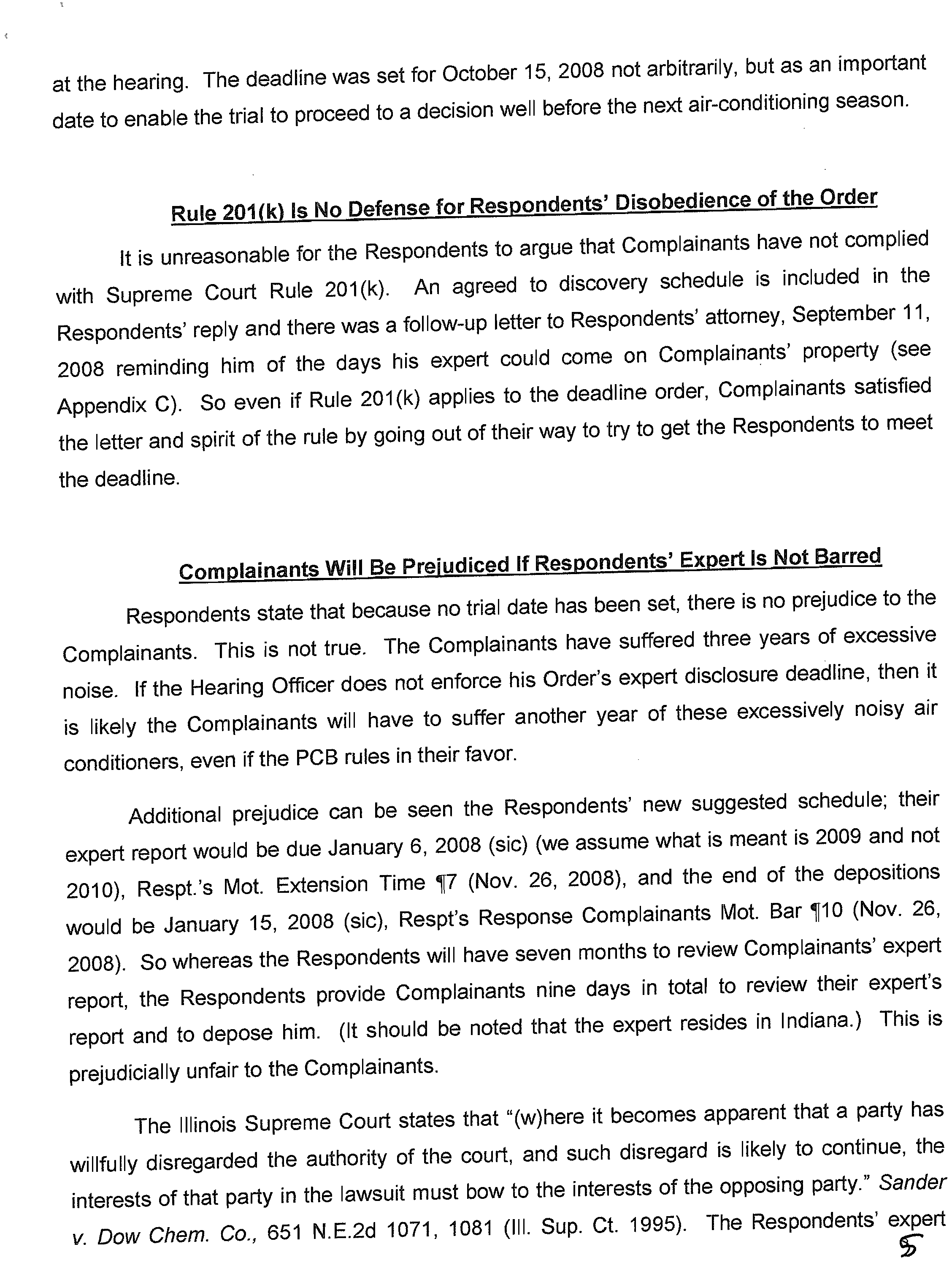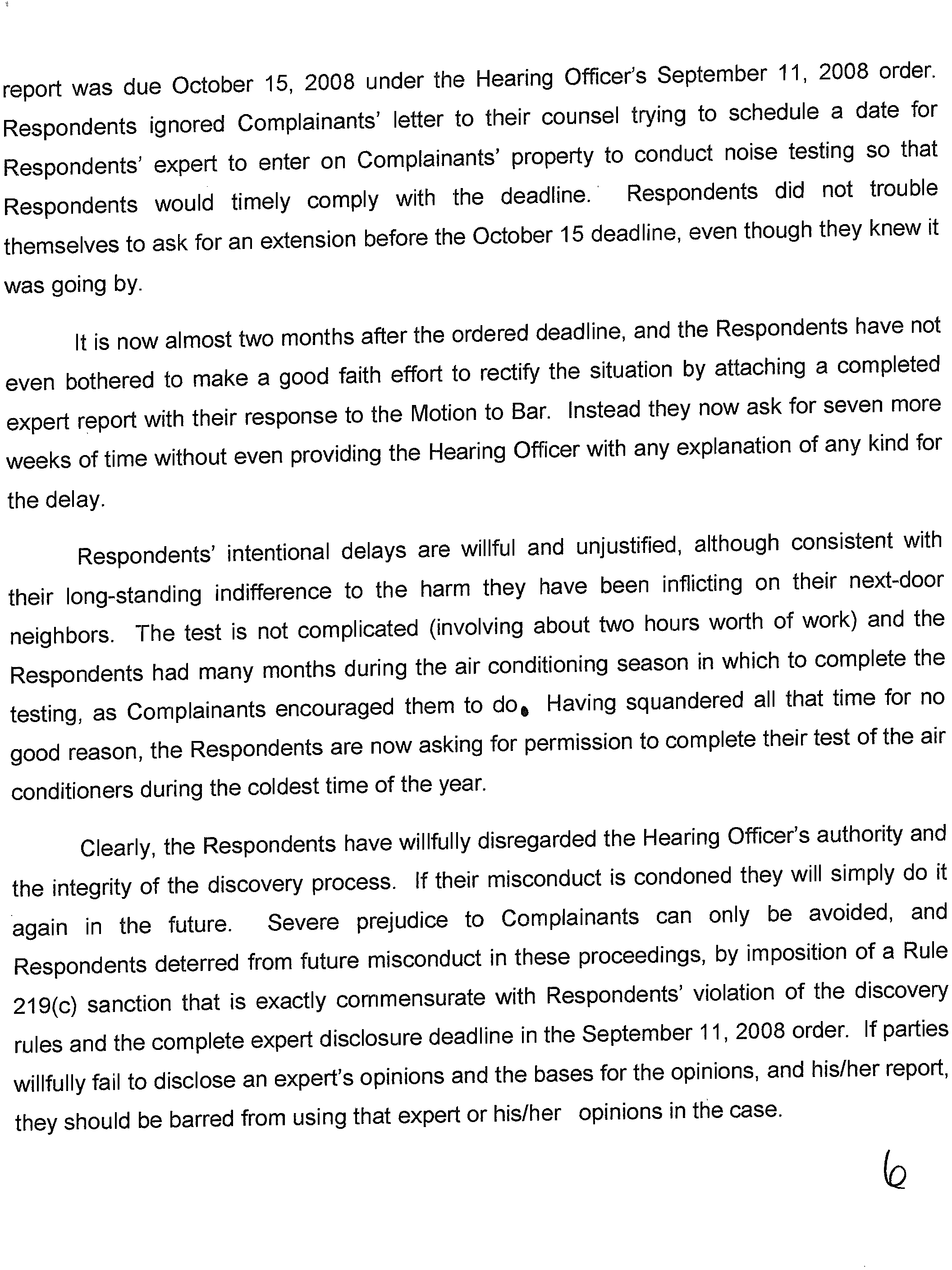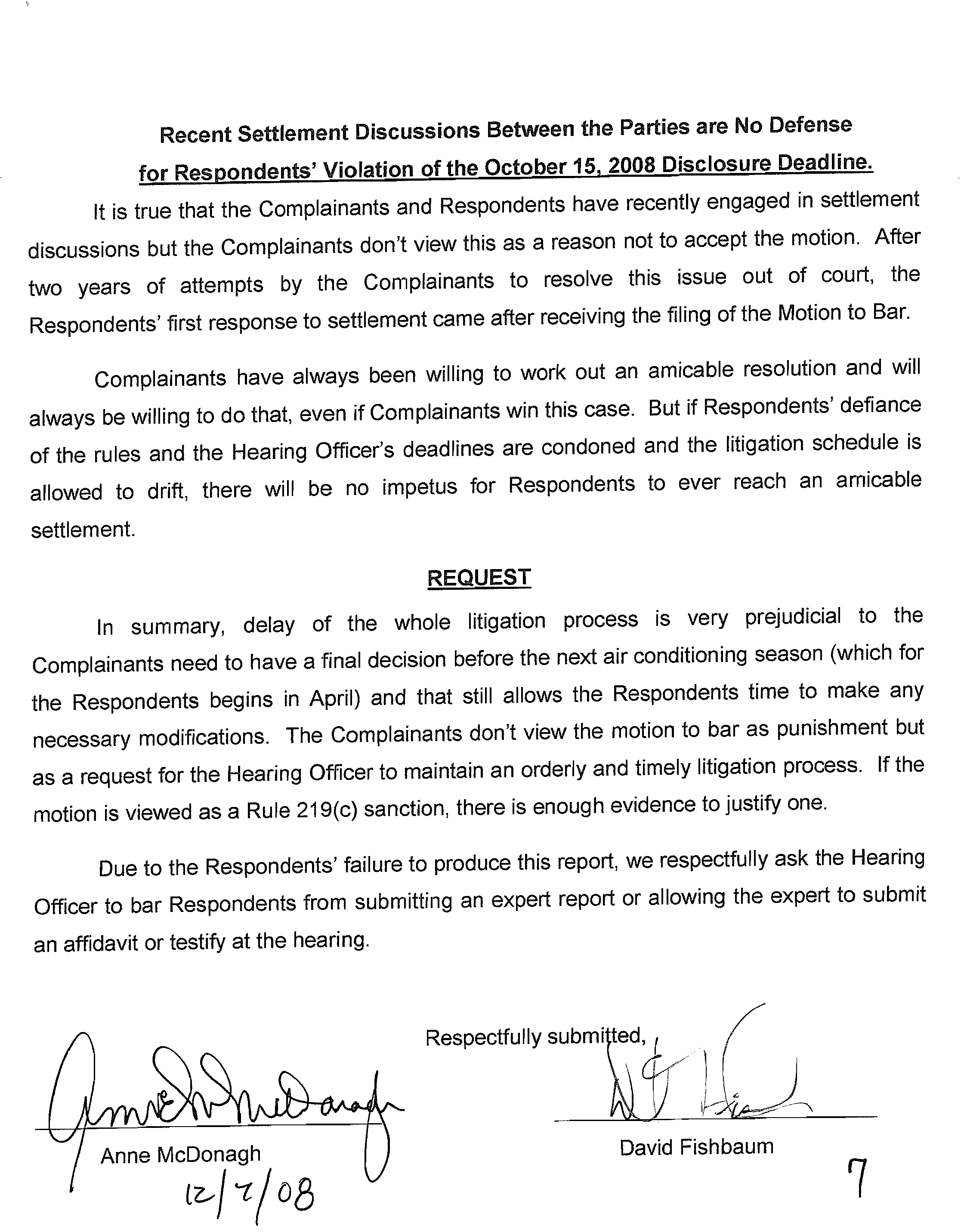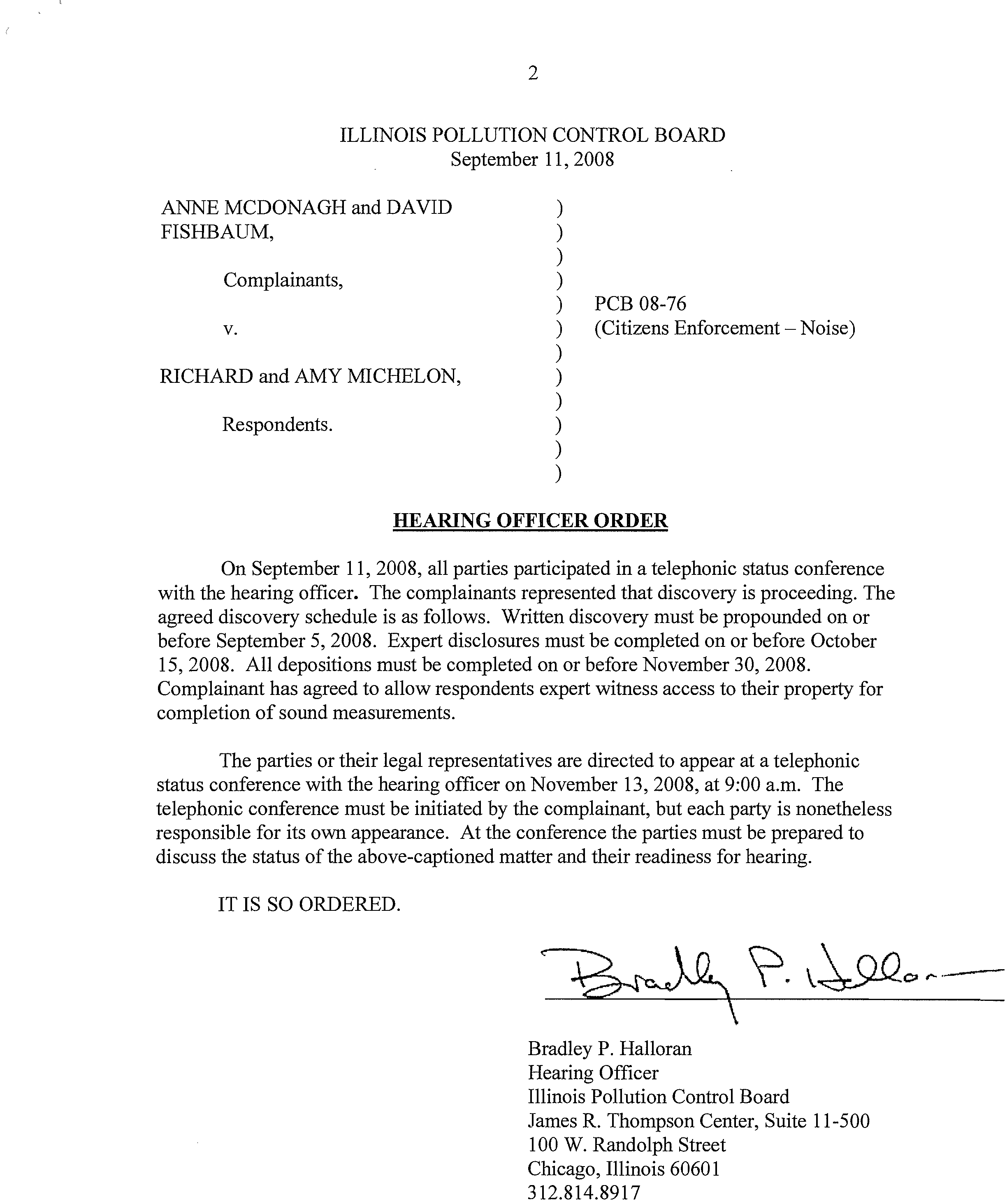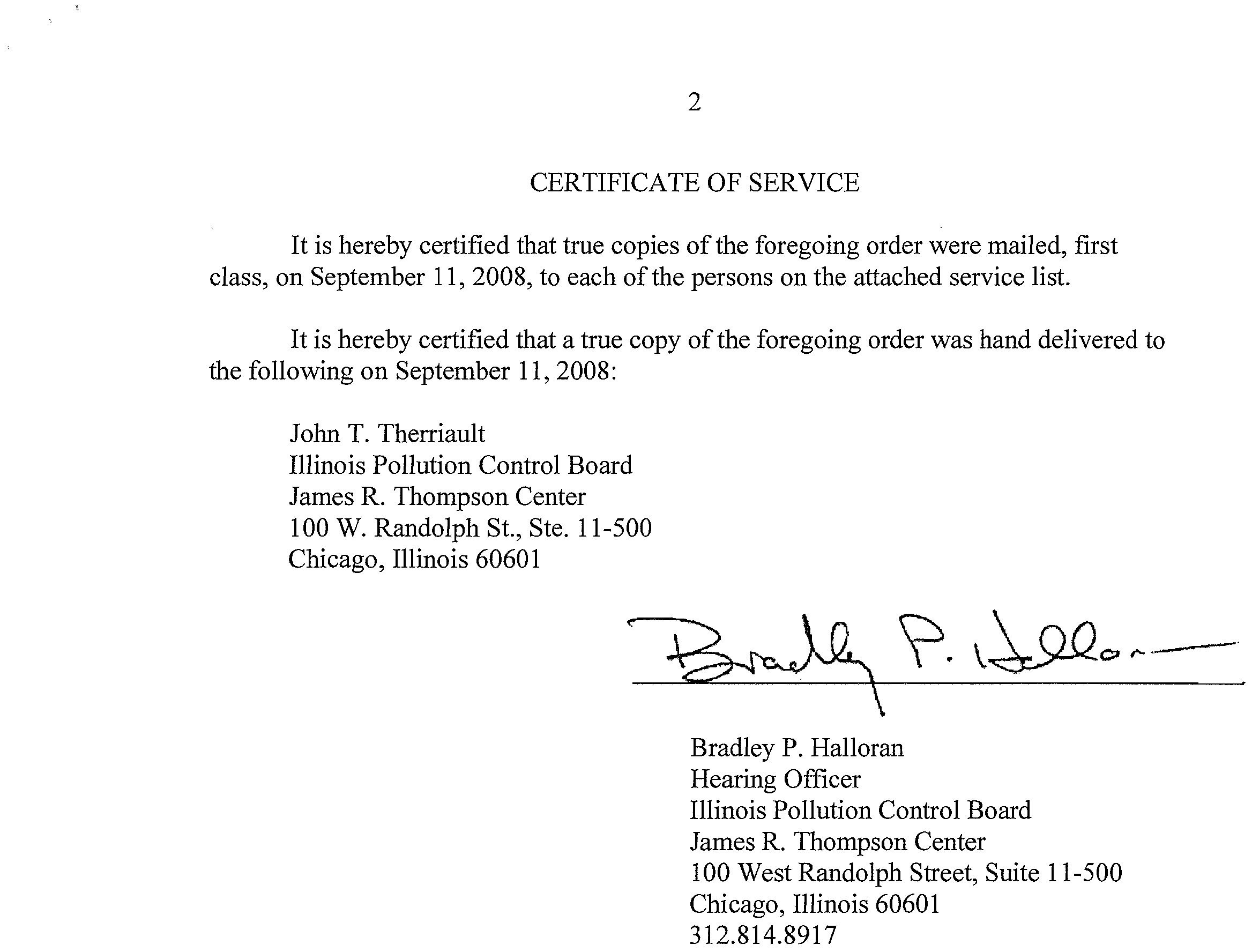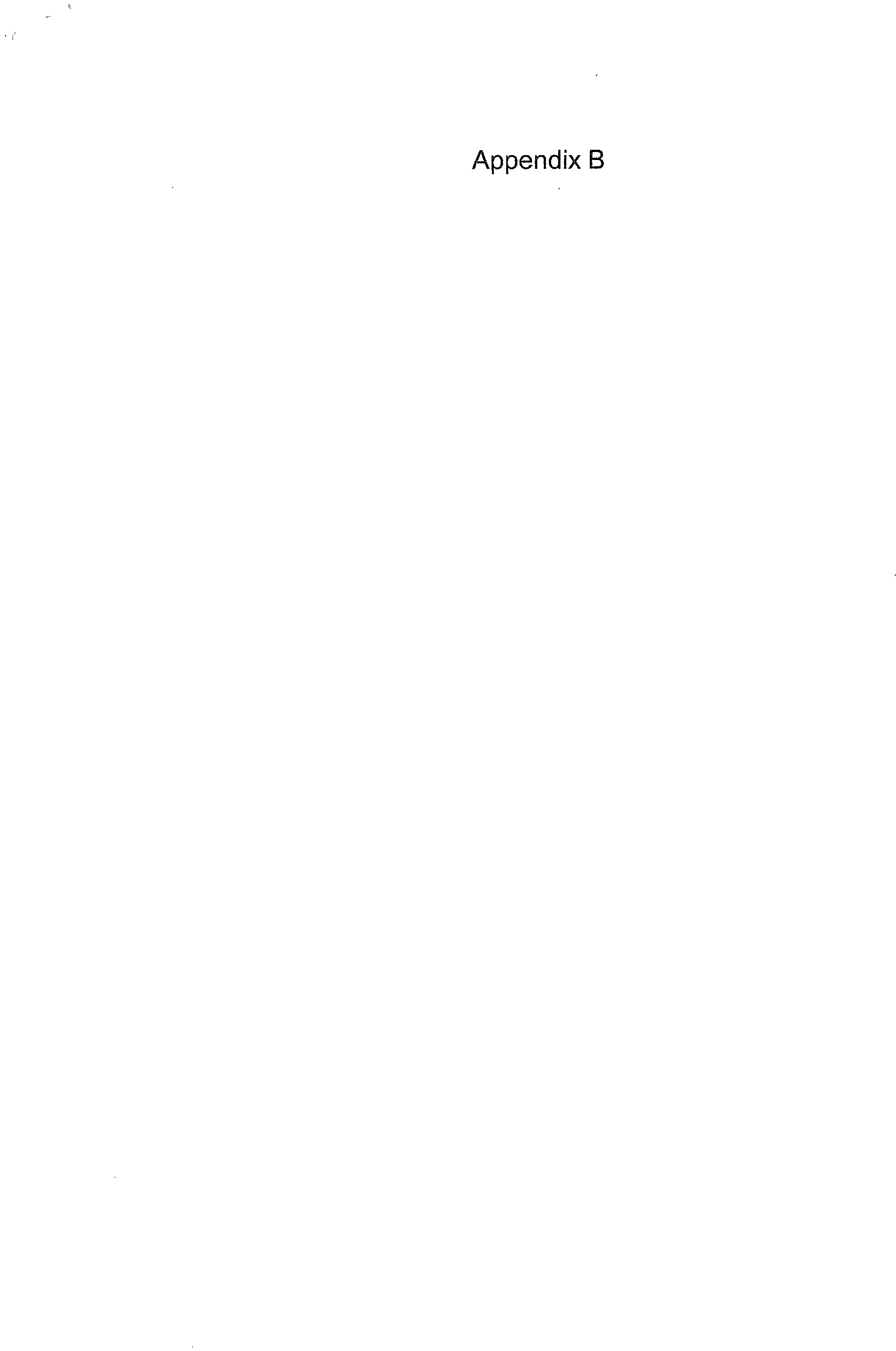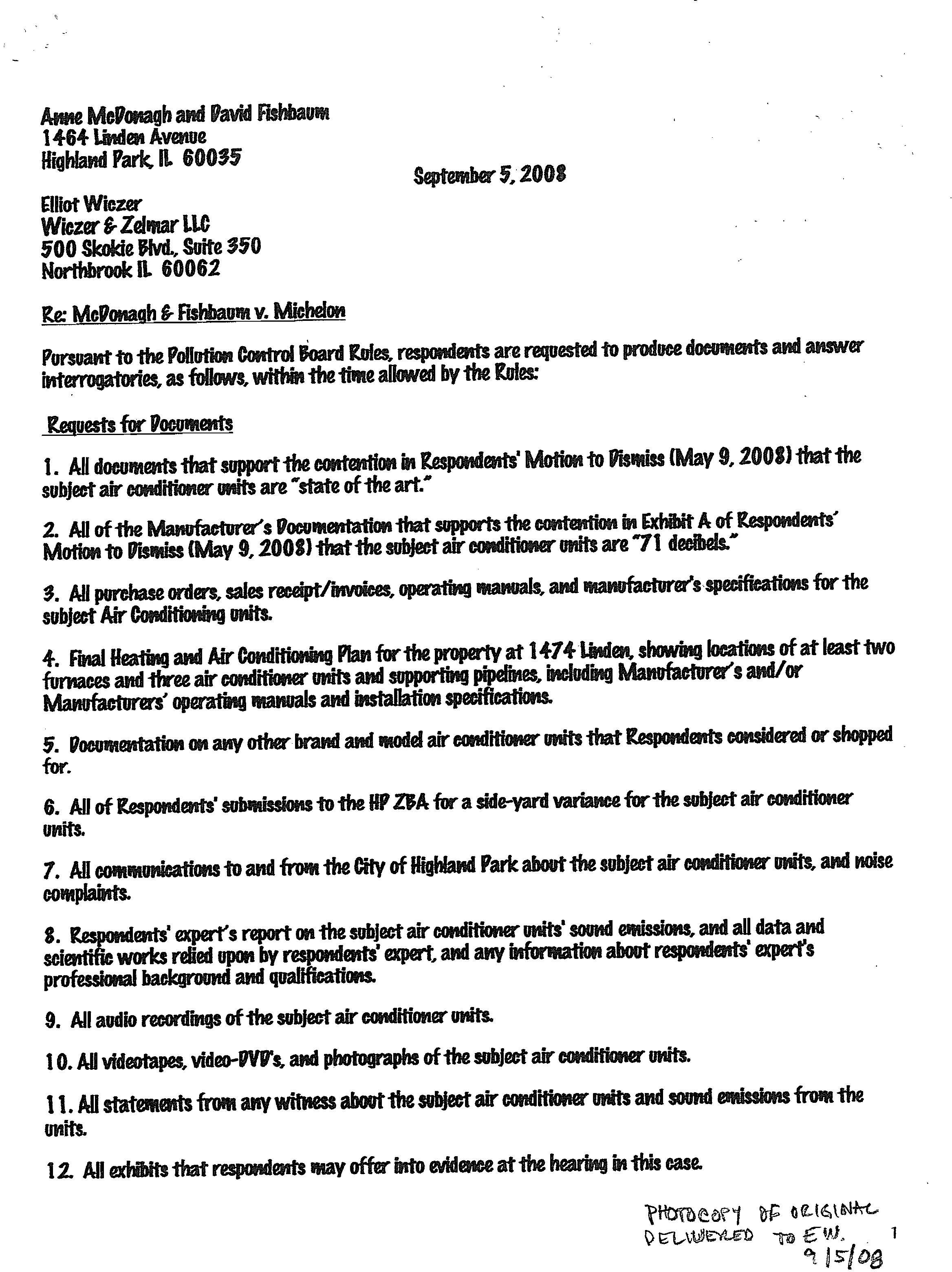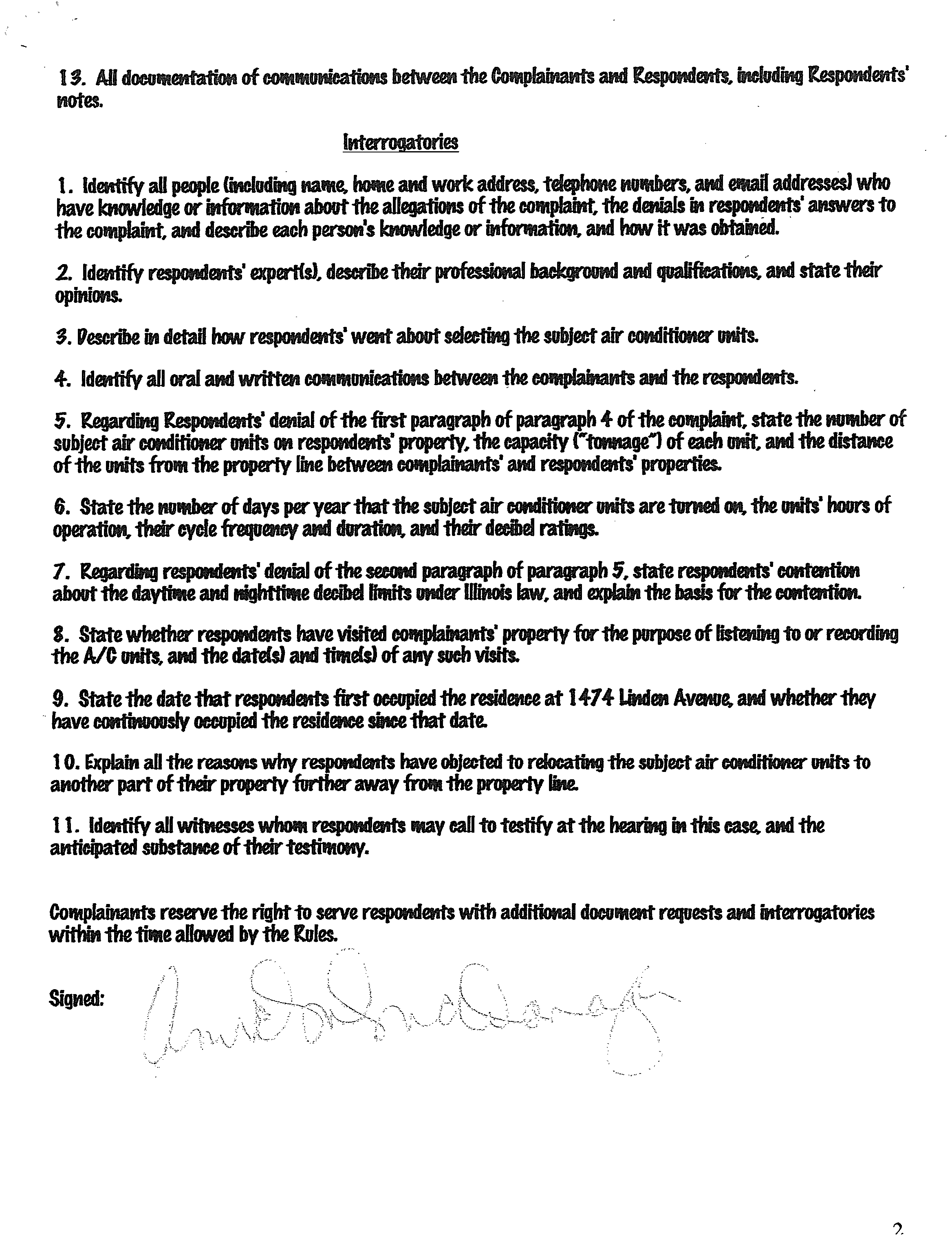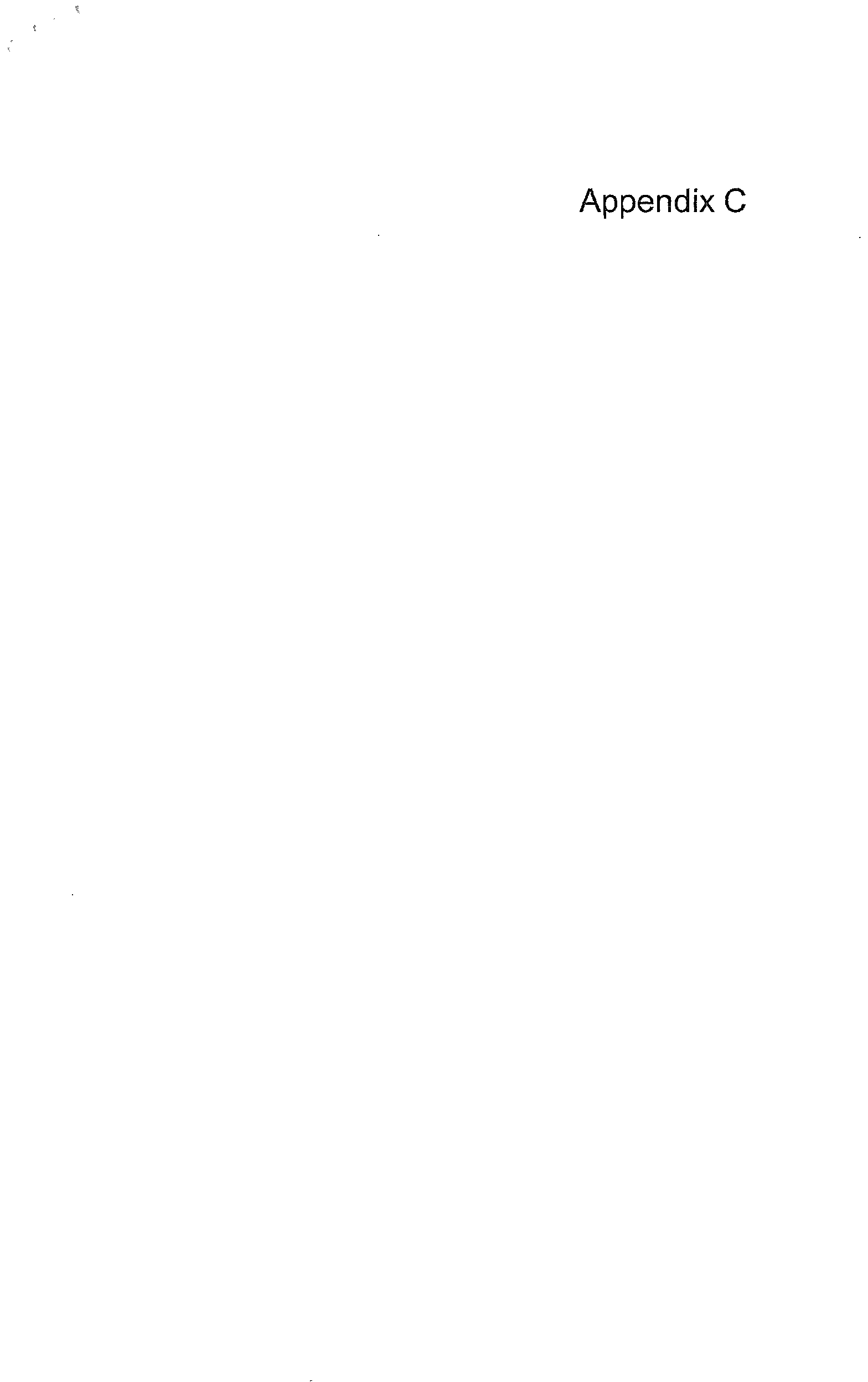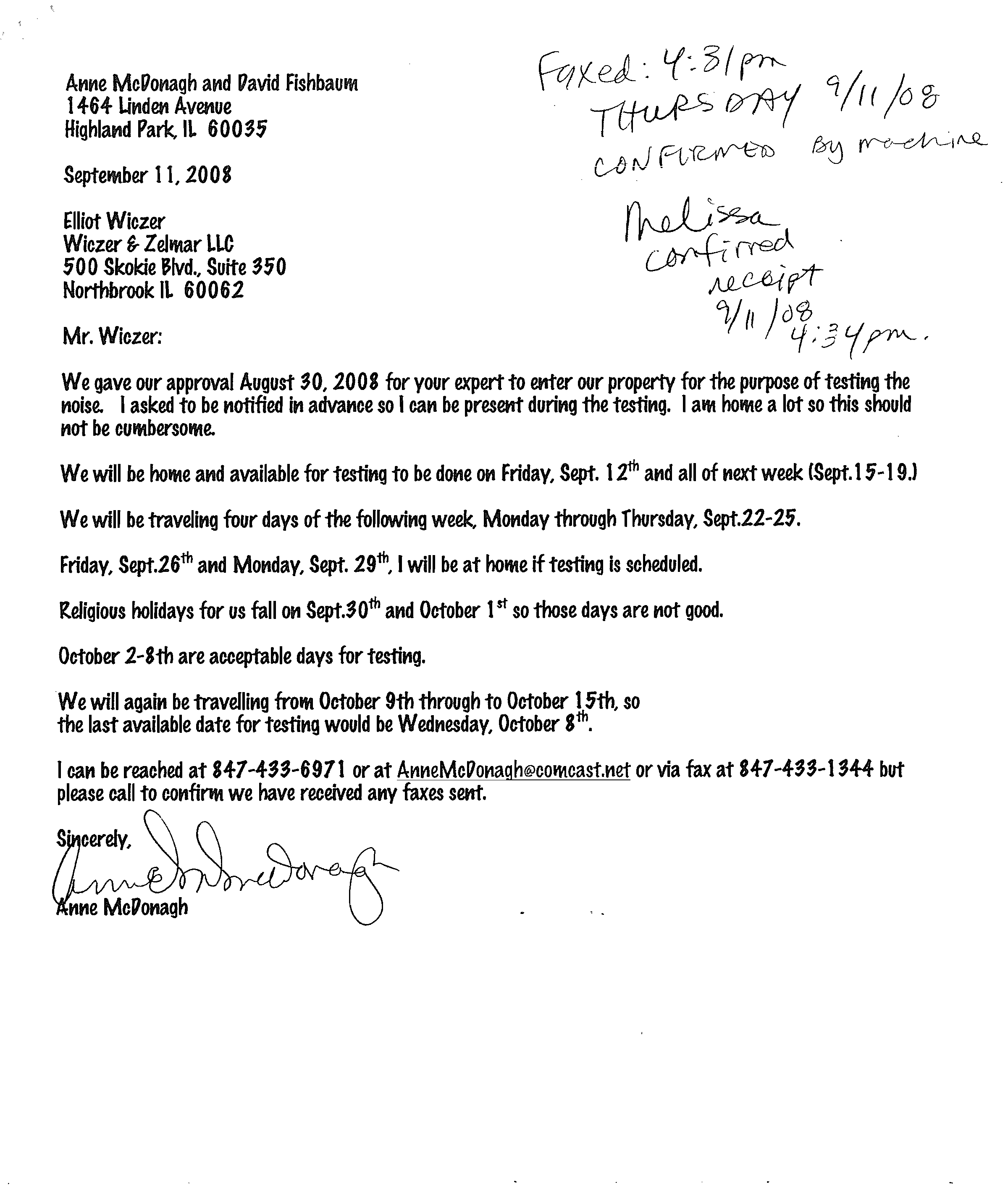State
of
Illinois
Pollution
Control
Board
CEflvE
James
R.
Thompson
Center
CLERK’S
OFFICE
100
W.
Randolph
Street,
Suite
11-500
DEC
09
2008
Chicago,
Illinois
60601
http://www.
ipcb.state.
ii.
us!
In
The
Matter
Of:
Anne
McDonagh
&
David
Fishbaum
1464
Linden
Avenue
Highland
Park,
IL
60035
Complainant(s),
V.
Richard
and
Amy
Michelon
1474
Linden
Avenue
Highland
Park
IL
60035
Respondent(s)
)
NOTICE
OF
FILINGTO:
Eliot
Wiczer,
Wiczer
&
Zelmar,
500
Skokie
Valley
Road,
Suite
350
Northbrook
IL
60067
PLEASE
TAKE
NOTICE
THAT
ON
December
8, 2008,
THE
UNDERSIGNED
MAILED to
the
State
of
Illinois
Pollution
Control
Board,
James
R.
Thompson
Center,
100
W.
Randolph
Street,
Suite
11-500,
Chicago,
IL
60601,
a copy
of
Complainants’
Response
to
Respondents’
Motion
for
Extension
of
Time,
a
copy
of
and
served
upon
you.
CERTIFICATE
OF
SERVICE
)
)
)
)
)
)
)
)
)
)
)
PCB
2008
-
076
(For
Board
use
only)
I,
Anne
McDonagh,
do
state
that
I
have
sent
a
copy
of
this
Response
to
be
served
upon
the
persons
named
above
by
sending
it via
U.S.
Mail
2008.
1
State
of
Illinois
Pollution
Control
Board
James
R.
Thompson
Center
100W.
Randolph
Street, Suite
11-500
DEC
092008
Chicago,
Illinois
60601
OtIUtj
Control
Board
http://www. ipcb.state.il.
us!
In
The
Matter
Of:
)
Anne
McDonagh &
David
Fishbaum
)
1464
Linden
Avenue
)
Highland
Park,
IL
60035
)
)
Complainant(s),
)
)
v.
)
PCB
2008
- 076
Richard
and
Amy
Michelon
)
(For
Board
use
only)
1474
Linden
Avenue
)
Highland
Park
IL
60035
)
Respondent(s)
)
COMPLAINANTS’
RESPONSE
TO
RESPONDENTS’
MOTION FOR
EXTENSION
OF
TIME
Summary
Complainants
file
this
Response
to
Respondents’
Motion
for
Extension of Time
to
Complete
Discovery.
We
oppose
this
Motion
on the
grounds
that
Section
101.522 of Part
101
(Title
35,
Environmental
Protection,
Subtitle
A;
General
Provisions, Chapter
I:
Pollution
Control Board)
Motions
for
Extension
of Time
states:
“The
Board
or
hearing
officer,
for
good
cause
shown
on
a
motion
after
notice
to
the
opposite
party,
may
extend
the
time
for
filing
any
document
or
doing
any
act
which
is
required
by
these
rules
to
be done
within
a limited
period,
either
before
or
after
the
expiration
of
time.”
(Underline added.)
We
posit
that
the
Respondents
have
failed
to
show
good
cause,
or indeed,
any
cause,
for
this extension.
Neither
have
they
notified
the
Opposite
Party.
Third,
there
is
no documentation
provided
for
their
contention
that
measurement
is actually
in
process
at this
time.
Fourth,
testing
their
air
conditioning
system
in
freezing
temperatures
cannot
replicate
summertime
levels
of
usage
and
noise.
Finally,
their
proposed
schedule
adjustment
wIJI
truncate
the
amount
of
time
allowed
Complainants
to
prepare
for
and
complete
expert
depositions
to
one
week,
an
unreasonably
short
amount
of
time.
Detail
First,
Respondents
have
failed
to
supply
any
reason
for the
delay.
As
initial
Complaint
was
filed
on
April
15,
2008,
they
had
six
full
months
of
time
to
assess
noise
while
their air
conditioner
was
running.
There
was no
reason
they
could
not
complete
one
hour’s
worth
of
assessment
during
that
six-month
period.
Second,
they
have
failed
to
notify
us
that
they
were
seeking
an
extension.
Third,
their
filing
is
devoid
of
any
documentation
to
support
their
contention
that
the
Expert
has
been
hired
and
work
is
in
process.
There
has
been
no
testing
on
our
land
that
we
know
of
and
we
have
not
been
contacted
so
that
any
work
can take
place in
the
future.
Fourth,
their
air
conditioners
have
not
operated,
to
our
knowledge,
since
October
15,
2008.
From
years
of
suffering
from
this
noise,
we
have
learned
that
air
conditioners
operate
less
frequently
in
cooler
temperatures
so
it
is
unclear
how
Respondents
and
Expert
will
replicate
summer
levels
of
operation
in
freezing
temperatures.
As
air
conditioners
operate
much
more
frequently
in
hotter
temperatures,
any
testing
will not
replicate
summer-level
incidences
of
noise,
It
is
disingenuous
to
offer
data
from
December
as
a
representative
sampling
of
summertime
noise
incidents.
Fifth,
Complainants
are
confounded
by
the
dates
proposed
in
Respondents’
two
filings
of
November
26,
2008.
Respondents
seek
to
compress
the
time
allotted
to
Complainants
to
prepare
for
Deposition
of
Expert
to
one
week.
Respondents
propose
to
deliver
Expert
Report
“no
later
than
January
6,
2008.”
(item
#7,
Respondents’
Motion
for
Extension
of
Time
to
Complete
Discovery)
In
Respondents’
Response
to
Claimants
(sic,
Complainants?)
Motion
to
Bar
Expert
Disclosure,
Item
#10,
Respondents
state
they
have
“filed a
motion
for
extension
of
time
to
complete
any
discovery,
including
depositions
and
supplement
to
January
15,
2008.”
(sic)
As
Respondents
file
via
U.S.
Mail
on
delivery
dates,
Complainants
expect
to
receive
the
Expert
Report a
few
days
later.
So
that
would
allow
about
six-seven
days,
including
a
weekend,
to
review
said
report,
prepare
for
depositions,
and
depose
an
Expert
who
resides
outside
Indianapolis,
Indiana.
(The
abbreviated
schedule
is
not
immediately
apparent,
as
the
two
dates do
not
appear
together
in
one
document.)
REQUEST
In
light
of
these
issues,
the
Complainants,
Anne
McDonagh
and
David
Fishbaum,
ask
the
Hearing
Officer
to
enter
an
order
denying
Respondents’
Motion for
Extension
of
Time.
Respectfully
submitted,
cDonagh
Date
3$
State
of Illinois
Pollution
Control
Board
James
R. Thompson
Center
DEC
092008
STATE
OF
100W. Randolph
Street,
Suite 11-500
P0tb01)C0fltroISoa,d
Chicago,
Illinois 60601
http://www.ipcb.state.
il.us/
In The Matter
Of:
Anne McDonagh
&
David Fishbaum
1464
Linden Avenue
Highland Park, IL 60035
Complainant(s),
V.
Richard
and
Amy Michelon
1474
Linden
Avenue
Highland Park IL 60035
Respondent(s)
)
NOTICE
OF
FILING
TO:
Eliot
Wiczer,
Wiczer
&
Zelmar,
500
Skokie Valley
Road, Suite 350
Northbrook IL
60067
PLEASE
TAKE NOTICE
THAT
ON December 8, 2008,
THE
UNDERSIGNED
MAILED
to
the
State
of Illinois
Pollution Control
Board,
James R. Thompson
Center,
100 W. Randolph
Street,
Suite
11-500,
Chicago,
IL 60601, Complainants’
Motion for
leave
to
file attached
Reply
Memorandum
in
Support
of Complainants’ Motion
to Bar
Respondents’ Expert’s
Opinions, a
copy
of which
is
attached
hereto and served
upon you.
CERTIFICATE
OF
SERVICE
I, Anne
McDonagh,
do
state that
I
have sent a copy
of this Motion
and Reply to be
served
upon the
persons
named
abo
by
se
lail
on
December
8, 2008.
)
)
)
)
)
)
)
)
)
)
)
PCB 2008
- 076
(For
Board use
only)
Anne
McDonagh,
Complainant
State
of
Illinois
Pollution
Control
Board
DEC
092008
James
R.
Thompson
Center
STATE
OF
ILLJNQg
O(tion
cflf
100
W.
Randolph
Street,
Suite
11-500
Chicago,
Illinois
60601
http:Ilwww.
ipcb.
state.iI.
us!
In
The
MatterOf:
Anne
McDonagh
&
David
Fishbaum
)
1464
Linden
Avenue
)
Highland
Park,
IL
60035
)
Complainant(s),
v.
)
PCB
2008
-
076
Richard
and
Amy
Michelon
)
(ForBoarduse
only)
1474
Linden
Avenue
)
Highland
Park
IL
60035
)
Respondent(s)
)
COMPLAINANTS
MOTION
FOR
LEAVE
TO
FILE
REPLY
IN
SUPPORT
OF
COMPLAINANTS’
MOTION
TO
BAR
RESPONDENTS’
EXPERT
Complainants,
Anne
McDonagh
and
David
Fishbaum,
respectfully
make
this
motion to
the
Hearing
Officer,
pursuant
to
Section
101.500(e)
of
Title
35
of
the
Illinois
Administrative
Code,
to
allow
Complainants
leave
to
file
the
attached
reply
in
support
of
Complainants’
motion
to
bar
Respondents’
expert
from
testifying
or
filing
an
affidavit
about any
opinions
in
this
case.
The
attached
Reply
is
necessary
to
respond
to
several
errors
and
incomplete
statements
in
Respondents’
response
to
the
Motion
to
Bar.
It
is
also
important
to
stress the
ill
prejudice
that
would
be
caused
to
Complainants
if
Respondents
are
allowed
to
delay
these
proceedings
any
further
and
disclose
their
expert
opinions
after
the
deadline
that
they
agreed
to
and
which
was
approved
by
the
Hearing
Officer.
Respecifully
submitted,
Anne
McDonagh
David
Fishbaum
State
of
Illinois
Pollution
Control
Board
James
R.
Thompson
Center
100
W.
Randolph
Street,
Suite
11-500
Chicago,
Illinois
60601
http://wwwJpCb.State.il.
us!
InTheMatterOf:
Anne
McDonagh
&
David
Fishbaum
)
1464
Linden
Avenue
)
Highland
Park,
IL
60035
)
)
Complainant(s),
)
v.
)
PCB
2008
- 076
Richard
and
Amy
Michelon
)
(For
Board
use
only)
1474
Linden
Avenue
)
Highland
Park
IL
60035
)
Respondent(s)
)
COMPLAINANTS’
REPLY
IN
SUPPORT
OF
COMPLAINANTS’
MOTION
TO
BAR
RESPONDENTS’
EXPERT
Complainants,
Anne
McDonagh
and
David
Fishbaum,
have
filed
a
Motion
to
Bar
Respondents’
expert
to
avoid
material
prejudice
to
their
rights
in this
case,
arising
from
the
Respondents’
failure
to
deliver
their
expert
report as
required
by
the
Hearing
Officer’s order
dated
September
11th, 2008
(see
Appendix
A).
Complainants
request
the
Hearing
Officer
to
grant
their
Motion
to
Bar.
1
RESPONDENTS
WERE
REQUIRED
TO
DISCLOSE
THEIR
EXPERT’S
OPINIONS
AND
REPORT
BY
THE
OCTOBER
15,
2008
DEADLINE
Both
parties
were
ordered
by
the
Hearing
Officer
to
make
complete
expert
disclosures
to
the
other
party
by
October
15,
2008.
All
Depositions,
including
experts,
were
ordered
completed
by
November
30,
2008.
[See
Hearing
Officer’s
9/11/08
Order,
Appendix
A].
On
September
5,
2008,
Complainants
hand-delivered
requests
for
documents
and
interrogatories
to
the
office
of
Respondents’
counsel.
[Appendix
B].
Complainants’
document
request
no.
8
requested:
Respondents’
expert’s
report
on
the
subject
air
conditioner
units’
sound
emissions,
and
all
data
and
scientific
works
relied
upon
by
respondents’
expert,
and
any
information
about
respondents’
expert’s
professional
background
and
qualifications.
The
Respondents
failed
to
produce
any
expert
report
or
data
and
scientific
works
relied
upon
by
their
expert.
Complainants’
interrogatory
no.
2
asked
respondents
to
“[ildentify
respondents’
expert(s),
describe
their
professional
background
and
qualifications,
and
state
their
opinions.”
Respondents’
answer
to
this
interrogatory
provided
the
name
and
address
and
a
CV
of
their
expert,
but
no
opinions.
Instead,
the
answer
stated
that
Respondents’
expert
“has
yet
to
provide
a
written
report.”
Respondents
try
to
make
much
of
their
answer’s
statement
that
“Respondents
specifically
reserve
the
right
to
supplement
their
answer
to
interrogatory
answer
number
2
at
a
later
date.”
Whatever
right
Respondents
might
have
to
supplement
their
answer
does
not
empower
them
to
ignore
and
disobey
a
Hearing
Officer
order
deadline
for
disclosure,
nor
allow
them
to
avoid
a
Motion
to
Bar.
On
this
issue,
the
Hearing
Officer
may
take
guidance
from
Supreme
Court
Rule
213(f)(3)
which
describes
expert
witness
disclosure
information:
Controlled
Expert
Witnesses.
A
“controlled
expert
witness”
is
a
person
giving
expert
testimony
who
is
the
party,
the
party’s
current
employee,
or
the
party’s
retained
expert.
For
each
controlled
expert
witness,
the
party
must
identify:
(i)
the
subject
matter
on
which
the
witness
will
testify;
(ii)
the
conclusions
and
opinions
of
the
witness
and
the
bases
therefor;
(iii)
the
qualifications
of
the
witness;
and
(iv)
any
reports
prepared
by
the
witness
about
the
case.
Illinois
Supreme
Court
Rule
213(f)(3)
(2008).
Based
on
the
Hearing
Officer’s
order,
the
interrogateries
and
document
requests
of
each
party,
and
the
Illinois
Supreme
Court
Rule,
Respondents
should
have
known
that
they
were
required
to
make
a
complete
expert
disclosure,
including
their
expert’s
opinion
and
report,
by
October
15,
2008.
It
is
misleading
for
Respondents
to
assert,
in
the
last
sentence
of
paragraph
5
of
their
response
to
the
Motion
to
Bar,
that
by
merely
providing
their
expert’s
name
and
address
and
CV,
“[t]hus,
Respondents
have
timely
disclosed
their
expert
as
required
by
the
August
14,
2008
discovery
schedule”
and
to
fail
to
mention
that
the
October
15,
2008
deadline
for
complete
expert
disclosures
in
the
parties’
agreed-to
schedule
was
made
an
integral
part
of
the
Hearing
Officer’s
September
11,
2008
Order.
Thus,
it
is
indisputable
that
Respondents
were
required
to
disclose
their
expert’s
opinions
and
report
by
October
15,
2008.
It
is
also
beyond
dispute
that
they
failed
to
do
so,
without
any
explanation,
justification,
or
request
for
extension
before
the
deadline
passed.
The
Complainants
filed
a
Motion
to
Bar
Expert
due
to
Respondents’
inexcusable
delay,
which
if
condoned,
will
greatly
prejudice
Complainants’
rights.
THE
HEARING
OFFICER
HAS
AUTHORITY
TO
BAR
RESPONDENTS’
EXPERT
Contrary
to
Respondents’
contention,
the
Complainants
have
not
filed
their
Motion
to
Bar
the
Respondents’
expert
witness
report
as
some
kind
of
punishment
or
penalty
for
Respondents’
failure
to
comply
with
the
discovery
schedule,
but
as
the
only
remedy
to
avoid
prejudice
to
the
Complainants,
from
Respondents’
violation
of
the
very
disclosure
deadline
that
the
parties
agreed
to
and
which
was
incorporated
into
the
Hearing
Officer’s
September
11,
2008
order.
Time
is
of
the
essence
to
the
Complainants.
They
have
suffered
three
years
of
excessive
noise
and
don’t
want
to
have
to
suffer
another
year.
The
Complainants
foresee
that
the
delays
of
the
Respondents
will
take
the
parties
into
another
air
conditioning
season
before
a
final
outcome
is
determined.
And
if
that
decision
is
made
in
favor
of
the
Complainants,
the
Respondents
will
likely
argue
hardship
at
that
point
in
time
(suffering
the
heat
of
a
Highland
Park
summer)
which
evidence
shows
begins
in
April
for
the
Respondents
and
so
won’t
be
able
to
implement
a
solution
until
the
winter
of
2009.
The
Hearing
Officer
may
take
guidance
from
Illinois
Supreme
Court
Rule
219(c)
that
allows
the
barring
of
a
party’s
expert
report
as
remedy
or
a
sanction.
The
Rule
states:
If
a
party
.
.
.
fails
to
comply
with
any
[discovery]
order
entered
under
these
rules,
the
court,
on
motion,
may
enter,
in
addition
to
remedies
elsewhere
specifically
provided,
such
orders
as
are
just,
including,
among
others,
.
.
.
[tjhat
a
witness
be
barred
from
testifying
concerning
that
issue.
Illinois
Supreme
Court
Rule
219(c)(iv)
(2008).
In
paragraph
7
of
their
response
to
the
Motion
to
Bar,
Respondents
cite
a
court
opinion
from
a
Champaign
construction
lawsuit,
Blakey
v.
Gilbane
Building
Corp.,
saying
that
the
rules
of
discovery
are
“not
to
punish
dilatory
parties.”
In
that
case,
the
judge
had
thrown
plaintiff’s
case
out
of
court
as
a
sanction
for
not
disclosing
a
prior
hospitalization,
which
had
occurred
five
years
before
the
accident
that
he
sued
over,
in
an
interrogatory
answer
about
his
medical
history.
The
appeals
court
said
that
“an
order
of
dismissal
with
prejudice
or
a
sanction
that
results
in
a
default
judgment
is
a
drastic
sanction
to
be
invoked
only
in
those
cases
where
the
party’s
actions
show
a
deliberate,
contumacious,
or
unwarranted
disregard
of
the
court’s
authority.”
Blakey
v.
Gilbane
Bldg.
Corp.,
708
N.E.
2d
1187,
1191(111.
App.
Ct.
4th
Dist
1999).
The
case
at
bar
is
a
very
different
case
from
the
Blakey
case.
Complainants
are
not
asking
for
a
default
judgment
against
Respondents.
Respondents
will
still
have
the
opportunity
to
have
their
lawyer
cross-examine
Complainants’
expert
at
the
hearing.
Unlike
Respondents,
Complainants
did
provide
their
expert’s
report,
and
opinions,
and
the
bases
of
his
opinions
on
April
15,
2008,
long
before
the
October
15,
2008
deadline.
Respondents
have
had
the
opportunity
to
review
those
opinions
and
the
report
with
their
own
expert
to
prepare
to
cross-examine
Complainants’
expert
at
the
hearing.
Complainants
have
been
denied
that
opportunity
and
right
by
Respondents’
failure
to
abide
by
the
Hearing
Officer’s
order.
The
Complainants
are
not
looking
to
punish
Respondents,
but
to
protect
their
rights
to
an
orderly
and
timely
litigation
process.
The
remedy,
barring
Respondents’
expert,
is
commensurate
with
the
Respondents’
misconduct,
willfully
violating
an
order
that
was
intended
to
safeguard
Complainants’
right
to
prepare
to
cross-examine
Respondents’
expert
at
the
hearing.
The
deadline
was
set
for
October
15,
2008
not
arbitrarily,
but
as
an
important
date
to
enable
the
trial
to
proceed
to
a
decision
well
before
the
next
air-conditioning
season.
Rule
201(k)
Is
No
Defense
for
Respondents’
Disobedience
of
the
Order
It
is
unreasonable
for
the
Respondents
to
argue
that
Complainants
have
not
complied
with
Supreme
Court
Rule
201(k).
An
agreed
to
discovery
schedule
is
included
in
the
Respondents’
reply
and
there
was
a
follow-up
letter
to
Respondents’
attorney,
September
11,
2008
reminding
him
of
the
days
his
expert
could
come
on
Complainants’
property
(see
Appendix
C).
So
even
if
Rule
201(k)
applies
to
the
deadline
order,
Complainants
satisfied
the
letter
and
spirit
of
the
rule
by
going
out
of
their
way
to
try
to
get
the
Respondents
to
meet
the
deadline.
Complainants
Will
Be
Prejudiced
If
Respondents’
Expert
Is
Not
Barred
Respondents
state
that
because
no
trial
date
has
been
set,
there
is
no
prejudice
to
the
Complainants.
This
is
not
true.
The
Complainants
have
suffered
three
years
of
excessive
noise.
If
the
Hearing
Officer
does
not
enforce
his
Order’s
expert
disclosure
deadline,
then
it
is
likely
the
Complainants
will
have
to
suffer
another
year
of
these
excessively
noisy
air
conditioners,
even
if
the
PCB
rules
in
their
favor.
Additional
prejudice
can
be
seen
the
Respondents’
new
suggested
schedule;
their
expert
report
would
be
due
January
6,
2008
(sic)
(we
assume
what
is
meant
is
2009
and
not
2010),
Respt.’s
Mot.
Extension
Time
¶7
(Nov.
26,
2008),
and
the
end
of
the
depositions
would
be
January
15,
2008
(sic),
Respt’s
Response
Complainants
Mot.
Bar
¶10
(Nov.
26,
2008).
So
whereas
the
Respondents
will
have
seven
months
to
review
Complainants’
expert
report,
the
Respondents
provide
Complainants
nine
days
in
total
to
review
their
expert’s
report
and
to
depose
him.
(It
should
be
noted
that
the
expert
resides
in
Indiana.)
This
is
prejudicially
unfair
to
the
Complainants.
The
Illinois
Supreme
Court
states
that
“(w)here
it
becomes
apparent
that
a
party
has
willfully
disregarded
the
authority
of
the
court,
and
such
disregard
is
likely
to
continue,
the
interests
of
that
party
in
the
lawsuit
must
bow
to
the
interests
of
the
opposing
party.”
Sander
v.
Dow
Chem.
Co.,
651
N.E.2d
1071,
1081
(Ill.
Sup.
Ct.
1995).
The
Respondents’
expert
c
report
was
due
October
15,
2008
under
the
Hearing
Officer’s
September
11,
2008
order.
Respondents
ignored
Complainants’
letter
to
their
counsel
trying
to
schedule
a
date
for
Respondents’
expert
to
enter
on
Complainants’
property
to
conduct
noise
testing
so
that
Respondents
would
timely
comply
with
the
deadline.
Respondents
did
not
trouble
themselves
to
ask
for
an
extension
before
the
October
15
deadline,
even
though
they
knew
it
was
going
by.
it
is
now
almost
two
months
after
the
ordered
deadline,
and
the
Respondents
have
not
even
bothered
to
make
a
good
faith
effort
to
rectify
the
situation
by
attaching
a
completed
expert
report
with
their
response
to
the
Motion
to
Bar.
Instead
they
now
ask
for
seven
more
weeks
of
time
without
even
providing
the
Hearing
Officer
with
any
explanation
of
any
kind
for
the
delay.
Respondents’
intentional
delays
are
willful
and
unjustified,
although
consistent
with
their
long-standing
indifference
to
the
harm
they
have
been
inflicting
on
their
next-door
neighbors.
The
test
is
not
complicated
(involving
about
two
hours
worth
of
work)
and
the
Respondents
had
many
months
during
the
air
conditioning
season
in
which
to
complete
the
testing,
as
Complainants
encouraged
them
to
do
Having
squandered
all
that
time
for
no
good
reason,
the
Respondents
are
now
asking
for
permission
to
complete
their
test
of
the
air
conditioners
during
the
coldest
time
of
the
year.
Clearly,
the
Respondents
have
willfully
disregarded
the
Hearing
Officer’s
authority
and
the
integrity
of
the
discovery
process.
If
their
misconduct
is
condoned
they
will
simply
do
it
again
in
the
future.
Severe
prejudice
to
Complainants
can
only
be
avoided,
and
Respondents
deterred
from
future
misconduct
in
these
proceedings,
by
imposition
of
a
Rule
219(c)
sanction
that
is
exactly
commensurate
with
Respondents’
violation
of
the
discovery
rules
and
the
complete
expert
disclosure
deadline
in
the
September
11,
2008
order.
If
parties
willfully
fail
to
disclose
an
expert’s
opinions
and
the
bases
for
the
opinions,
and
his/her
report,
they
should
be
barred
from
using
that
expert
or
his/her
opinions
in
the
case.
(2
Recent
Settlement
Discussions
Between
the
Parties
are
No
Defense
for
Respondents’
Violation
of
the
October
15,
2008
Disclosure
Deadline.
It
is
true
that
the
Complainants
and
Respondents
have
recently
engaged
in
settlement
discussions
but
the
Complainants
don’t
view
this
as
a
reason
not
to
accept
the
motion.
After
two
years
of
attempts
by
the
Complainants
to
resolve
this
issue
out
of
court,
the
Respondents’
first
response
to
settlement
came
after
receiving
the
fiJing
of
the
Motion
to
Bar.
Complainants
have
always
been
willing
to
work
out
an
amicable
resolution
and
will
always
be
willing
to
do
that,
even
if
Complainants
win
this
case.
But
if
Respondents’
defiance
of
the
rules
and
the
Hearing
Officer’s
deadlines
are
condoned
and
the
litigation
schedule
is
allowed
to
drift,
there
will
be
no
impetus
for
Respondents
to
ever
reach
an
amicable
settlement.
REQUEST
In
summary,
delay
of
the
whole
litigation
process
is
very
prejudicial
to
the
Complainants
need
to
have
a
final
decision
before
the
next
air
conditioning
season
(which
for
the
Respondents
begins
in
April)
and
that
still
allows
the
Respondents
time
to
make
any
necessary
modifications.
The
Complainants
don’t
view
the
motion
to
bar
as
punishment
but
as
a
request
for
the
Hearing
Officer
to
maintain
an
orderly
and
timely
litigation
process.
If
the
motion
is
viewed
as
a
Rule
219(c)
sanction,
there
is
enough
evidence
to
justify
one.
Due
to
the
Respondents’
failure
to
produce
this
report,
we
respectfully
ask
the
Hearing
Officer
to
bar
Respondents
from
submitting
an
expert
report
or
allowing
the
expert
to
submit
an
affidavit
or
testify
at
the
hearing.
Respectfully
Anne
McDonagh
L/
‘t/o5
David
Fishbaum
7
Appendix
A
2
ILLINOIS POLLUTION CONTROL BOARD
September
11, 2008
ANNE MCDONAGH and
DAVID
)
FISHBAUM,
)
)
Complainants,
)
)
PCB 08-76
v.
)
(Citizens
Enforcement
— Noise)
)
RICHARD and AMY MICHELON,
)
)
Respondents.
)
)
)
HEARING OFFICER ORDER
On
September 11, 2008, all parties participated in
a
telephonic status conference
with the hearing
officer. The complainants represented that discovery is proceeding.
The
agreed discovery schedule is as follows. Written discovery must be propounded on
or
before
September
5, 2008. Expert disclosures must be completed on or before October
15, 2008.
All depositions must be completed on or before November
30,
2008.
Complainant has agreed to allow respondents expert witness access to their property
for
completion of sound measurements.
The parties
or their legal representatives are
directed to appear at a telephonic
status conference
with
the
hearing
officer on November 13, 2008, at 9:00 a.m. The
telephonic
conference must be initiated
by
the complainant,
but
each party is nonetheless
responsible for its own appearance. At the conference the
parties must be prepared to
discuss
the status of the above-captioned matter and their readiness for hearing.
IT IS SO
ORDERED.
Bradley P. Halloran
Hearing Officer
Illinois Pollution Control Board
James R. Thompson Center, Suite 11-500
100 W. Randolph Street
Chicago, Illinois 60601
312.814.8917
2
CERTIFICATE OF SERVICE
It is hereby certified that true copies of the foregoing order were mailed, first
class, on
September 11, 2008, to each
of the
persons
on the
attached service list.
It is hereby certified that a true copy of the foregoing order was hand delivered to
the following on September 11, 2008:
John T. Therriault
Illinois Pollution Control Board
James
R. Thompson Center
100W. Randolph St., Ste. 11-500
Chicago, Illinois 60601
Bradley P. Halloran
Hearing
Officer
Illinois
Pollution Control Board
James
R. Thompson Center
100 West Randolph Street, Suite 11-500
Chicago, Illinois 60601
312.814.8917
Appendix B
Anne
McVonagb
and
Pavid
Flshbavm
1464
Linden
Avenue
Highland
Failc
IL
6005
September
5;200*
Elliot
Wiezer
WiozerSZelmarLLC
500
Skokle
blvd.,
Suite
S50
NortlibrookiL
60062
e
MoPonagh
Fishbaum
v
MicheIon
Pursuant
to
the
Pollution
Control
$oard
tde
respondents
are
requested
to
produce
documents
and
answer
interrogatories,
as
follows,
within
the
lime
allowed
by
the
uIes
equests
for
Pocuments
1.
Aft
documents
that
support
the
contention
in
Vespceidents’
Motion
to
Pismiss
(May
9,
200*)
that
the
subject
air
conditioner
units
are
tm
state
of
the
art
2.
All
of
the
ManufacturWs
Pocumentailon
that
supports
the
contention
hi
Exhibit
A
of
respondents’
Motloe*
to
Pisiniss
(May
9,
200*)
that
the
subject
air
conditioner
units
are
71
decibels.’
.
All
purchase
orders,
sales
receipt/invoices,
operating
manuals,
and
manvfactvrWs
specifications
for
the
subject
Air
Conditio
units.
4.
Final
Heating
and
Air
Conditioning
Plan
for
the
property
at
I
47+Lind
showing
kicatloets
of
at
least
Iwo
furnaces
and
three
air
conditioner
units
and
supporting
pipelines,
including
MamifacturWs
and/or
Manufacturers’
operating
manuals
and
hislaibtion
specifications.
5.
Pocumeetlation
on
any
other
trawl
and
model
air
conditioner
units
that
cspondents
considered
or
shopped
6.
All
of
Kcspondeetts’
submissions
to
the
HP
ZA
for
a
side-yard
variance
for
the
subject
air
coetdiffoeaer
units.
7.
All
communications
to
and
from
the
City
of
Highland
Park
about
the
subject
air
conditioner
units,
and
noise
complaints.
8.
espondestts’
expert’s
report
on
the
subject
air
conditioner
units’
sound
emissions,
and
aft
data
and
expert
and
any
information
about
respondents’
experrs
9.
MI
audio
recordings
of
the
subject
air
conditioner
units.
10.
Aft
videotapes,
vidco-PVP’s,
and
photographs
of
the
subject
air
conditioner
units.
11.
All
statemeetl
from
any
witness
about
the
subject
air
conditioner
units
and
sound
emissions
from
the
units.
12.
Aft
exhibits
that
respondents
may
offer
into
evidence
at
the
hearing
in
this
case.
-
0
i
g.
n
doentatjoi
of co
unications
between
the Complainants
and
esposd€nts,
including
respondents’
notes.
Interrogatories
1. Identify
all people
(including
iiame,
home
and work
address. telephone
numbers,
awl
email
addresses)
who
have knowledge
or informaiton
about the
allegations
of
the
complaint
the denials
at
respondents’
answers
to
the
complaint
and describe
each
person’s
knowledge
or
information,
and
how it
was
obtained.
2. Identify
respondents’
expert(s),
describe
their
professional
background
and
qualifications,
and state
their
Opinions.
.
Pescribe
in
detail
how
respondents’
went about
selecting the
subject
air
conditioner
units.
4. Identify
all
oral and
written com
unleatioss
between the
complainants
and the
respondents.
5.
Kegardktg
esposdents’
denial
of
the
first
paragraph
of paragraph
4
of the complaint,
state the nwsiber
of
subject
air
conditioner
units
on
respondesW
properly,
the
capacity
rto.magel
of each
unit,
and
the
distance
of
Th€ units
from
the properly
he between
complainants’
and
respondents’
properties.
S. State
the
number of
days
per
year that
the
subject air
conditioner
units
are turned
the
units’
hours
of
operation,
their
cycle
frequency
and duration,
and
their decibel
ratings.
1.
eqardkig
respondents’
denial
of
the second
paragraph
of paragraphS,
state respondents’
contention
about
the daytime
and .dghttime
decibel
liu,dts
under
illinois
law,
and
explain
the basis
for
the
contention.
S.
State
whether respondents
have visited
complainants’
properly
for the purpose
of
listening
to or
recording
the A/C
units,
and
the
date(s)
and
time(s)
of
any
such
visits.
9.
Slate
the date
that
respondents
first occupied
the residence
at 1474
Linden Avenue
and whether
they
have continuously
occupied
the residence
since
that
date.
10.
xp1ain
all the reasons
why respondents
have
objected
to
relocating
the subject
air
conditioner
units
to
another
part
of
their
properly
further away
from
the
property
line.
11.
Identify all
wihiesses whom
respondents
may
call to
testify
at the
hearing
in
this
ease and the
anticipated
substance
of
their
testimony.
Complainants
reserve
the
right
to serve respondents
with
additional
document
requests
and
biterrogatories
within
the time allowed
by
the
rules.
Signed
Appendix
C
A(f•
Anne Mconaqh
and
9avid
Fishbaum
-i
7--’
1464
Linden
Avenue
Highland Park,
II.
6005
Septemberll,2008
lUot
Wiczer
Wiczer
- Zehnar
LLC
500
Skokie lvd.,
Suite 50
Northbrookll.
60062
Mr. Wiczer:
We
gave
our approval
August
0,
2008 for
your expert
to enter our
property for
the purpose
of testing
the
noise.
I asked to
be notified
lii
advance
so
I
can
be
present during
the
testhig.
I
am home a
lot so this
should
not
be
cumbersome.
We
will be home
and
available
for testing
to be
done
on
Friday,
Sept.
I
2
m
and
all
of
next week
(Sept.
15-19.)
We will
be
traveling
four
days
of
Th€
following
week,
Monday
through
Thursday,
Sept22-25.
Friday,
Sept26Th
and
Monday,
Sept.
29
m,
I
will
be
at
home
if
testing
is scheduled.
eIigious
holidays
for
us fail
on
Sept.$O
and
October
1 so
those days
are not good.
October
2-8th
are acceptable
days
for
testing.
We
will again
be travelling
from
October 9th
through to
October
15th,
so
the
last
available
date for testing
would
be Wednesday,
October
8.
I
can be reached
at 847-4S-6971
orat
AijneMcLlonaqhcomcast.net
or
via
fax
at S47-4-1
44 but
please call
to confirm
we
have
received
any
faxes sent.
flA
Vn
/
1o
7
/IP-Y_,
Mc9onagh
